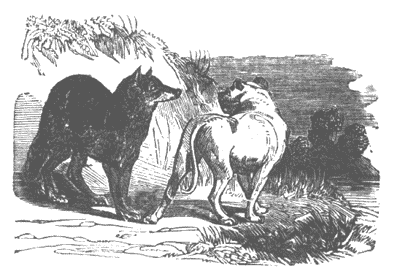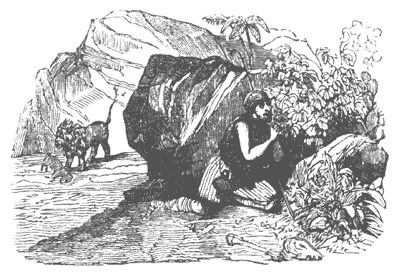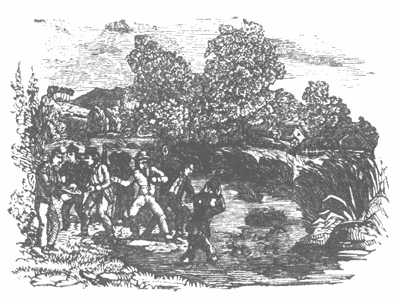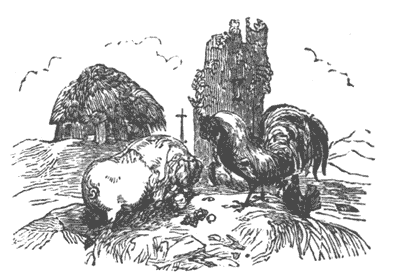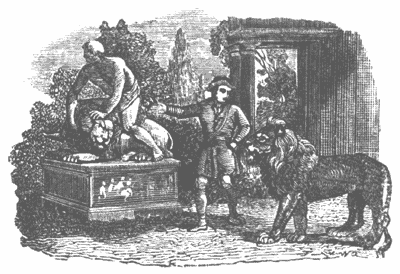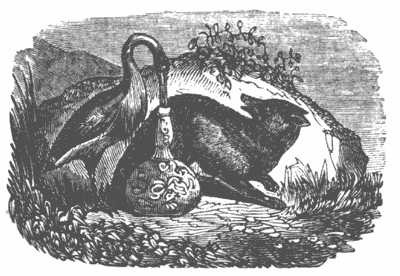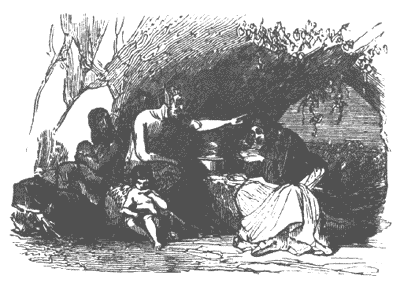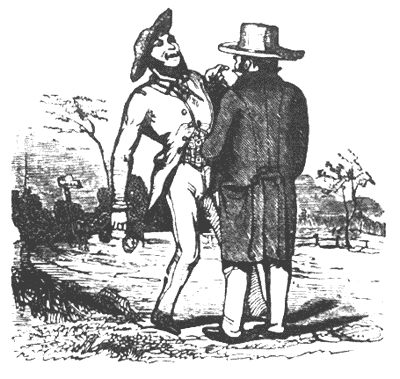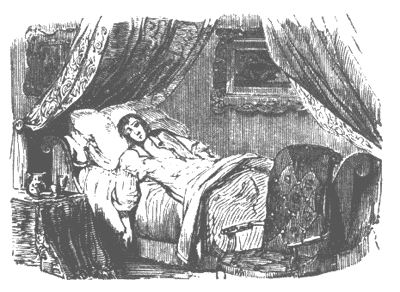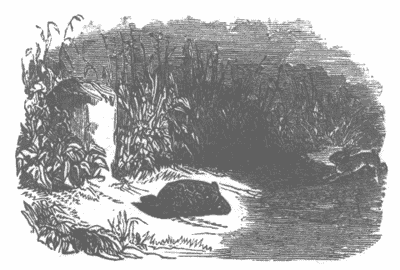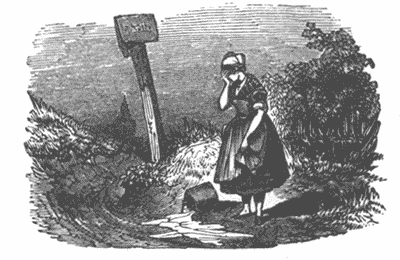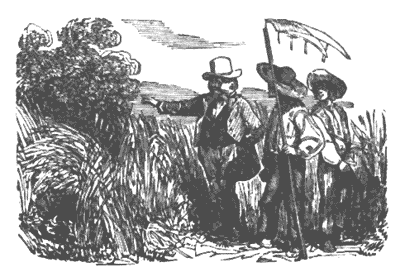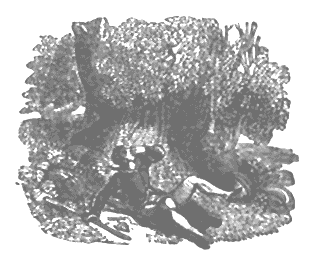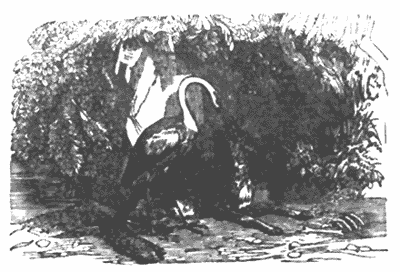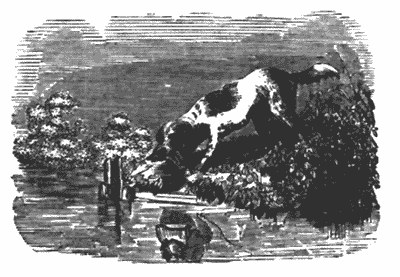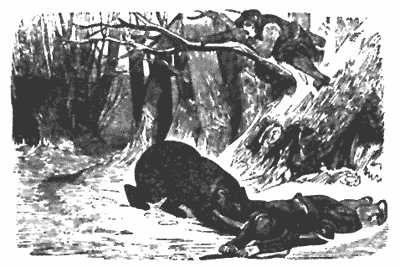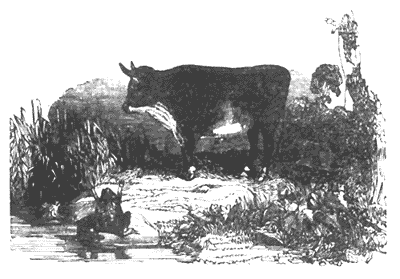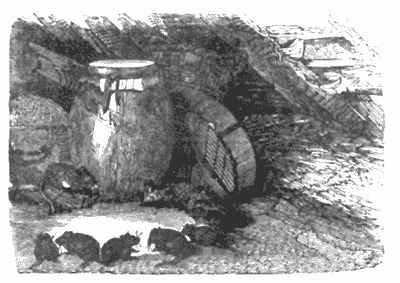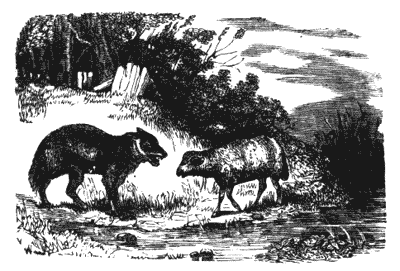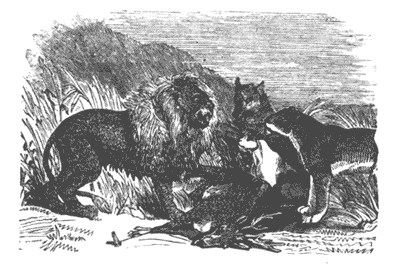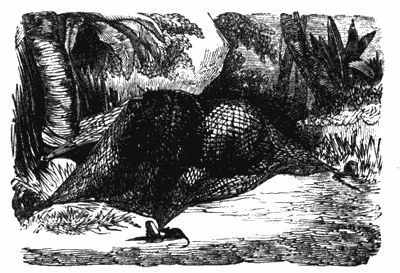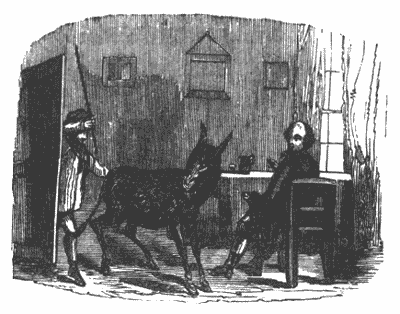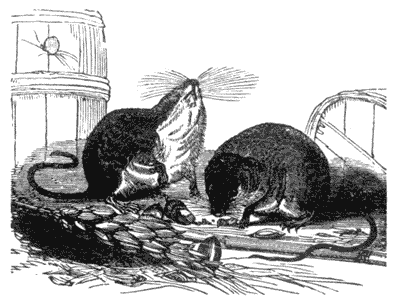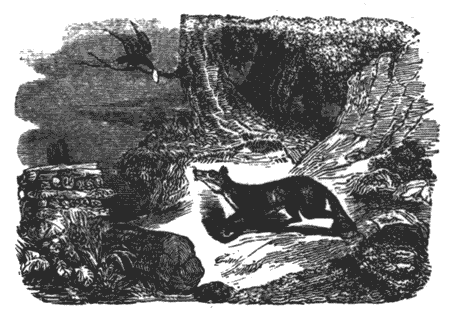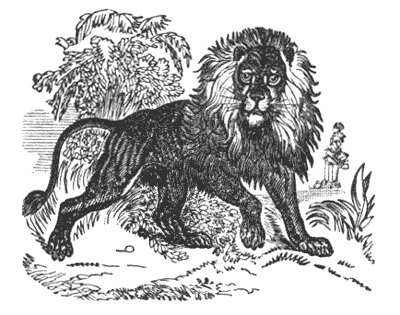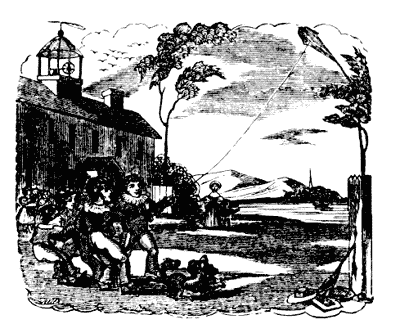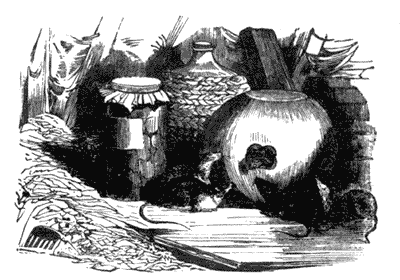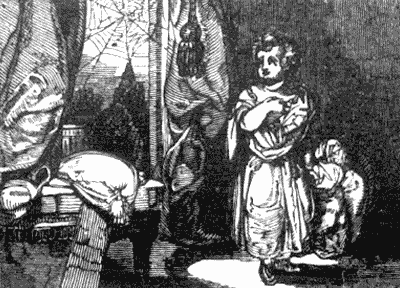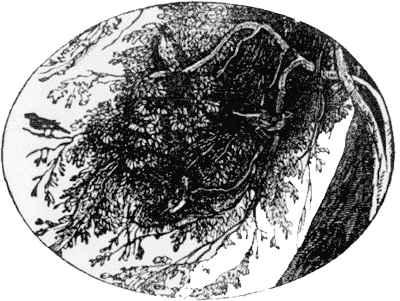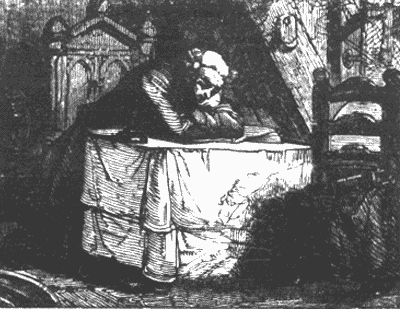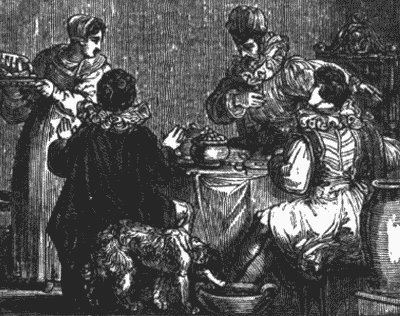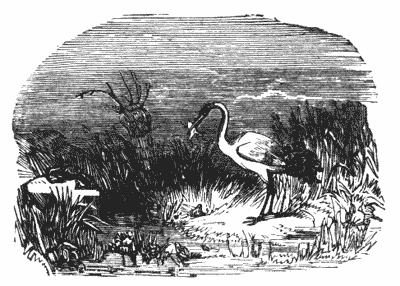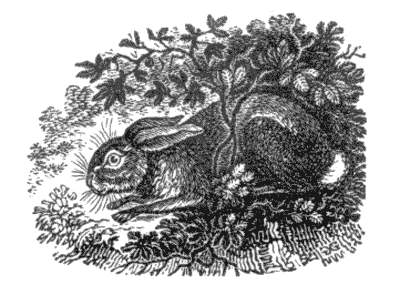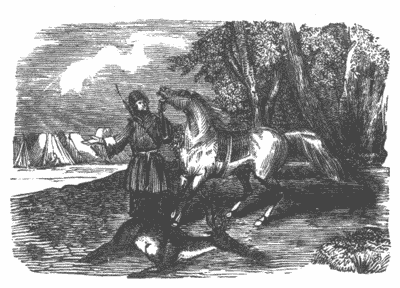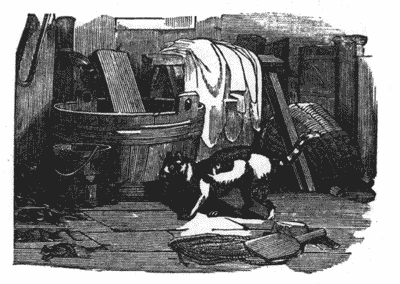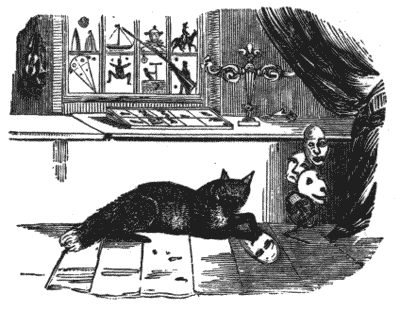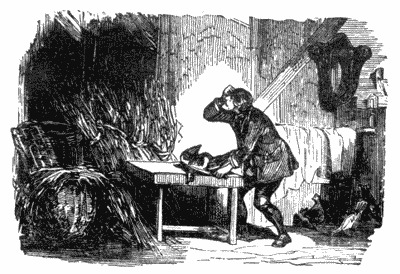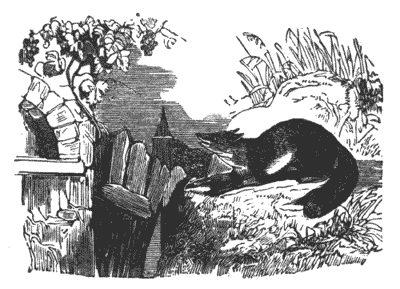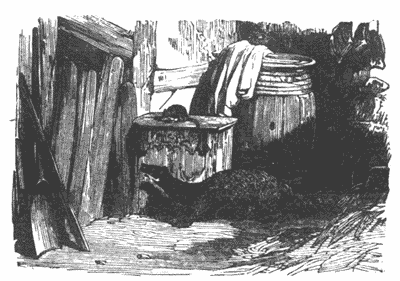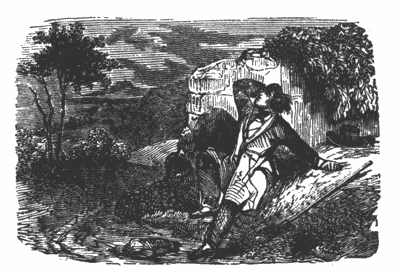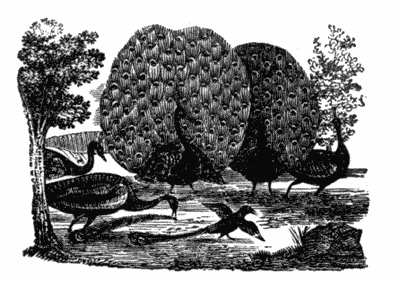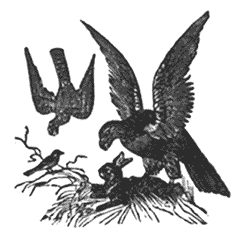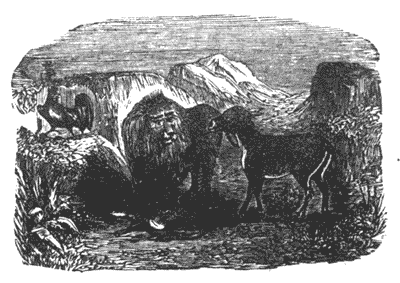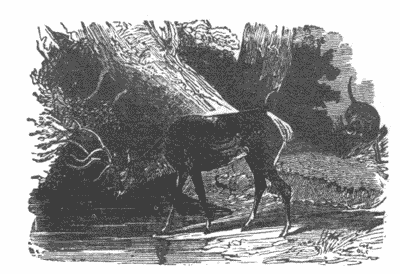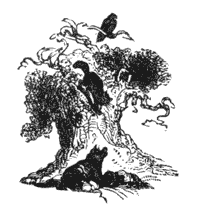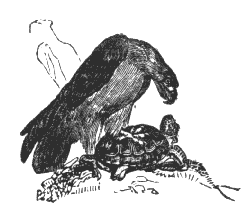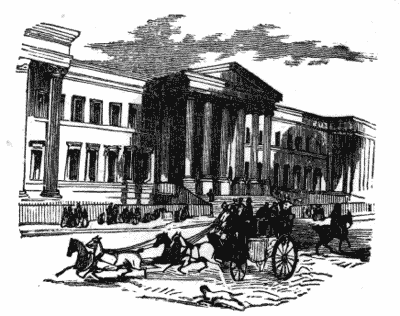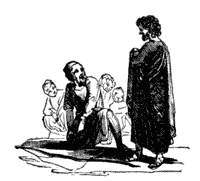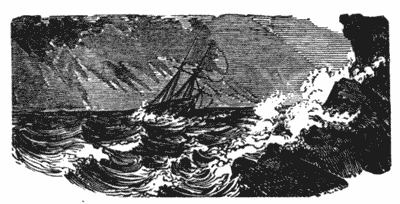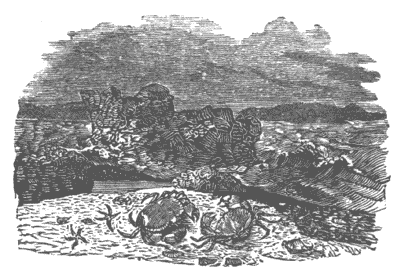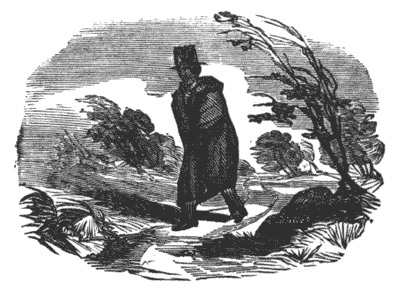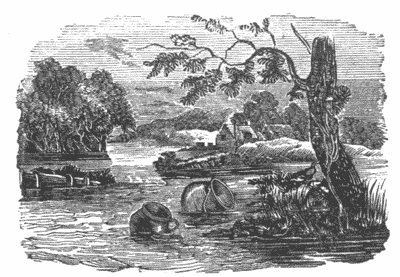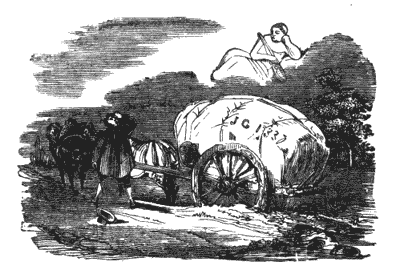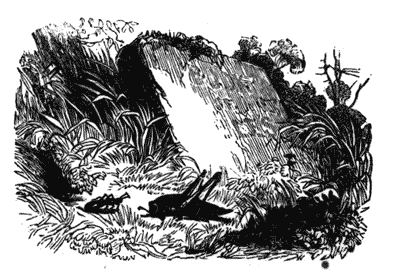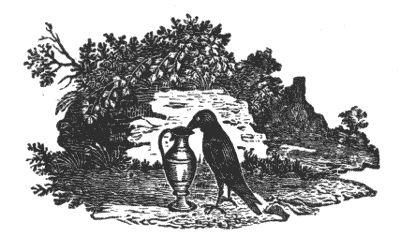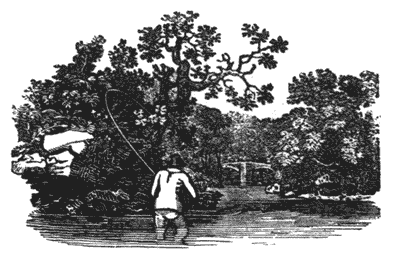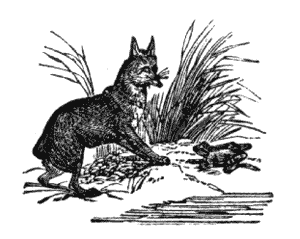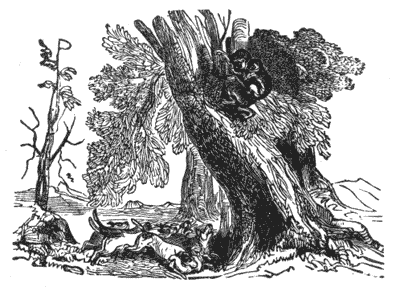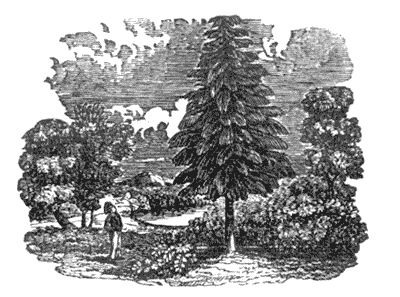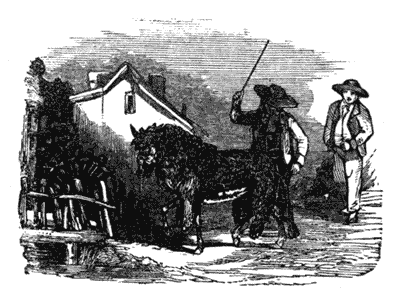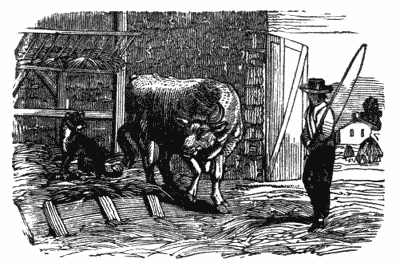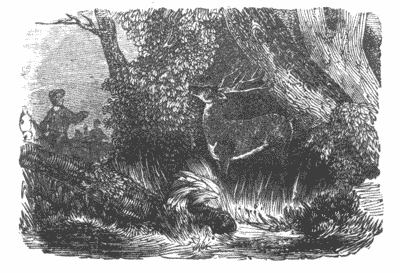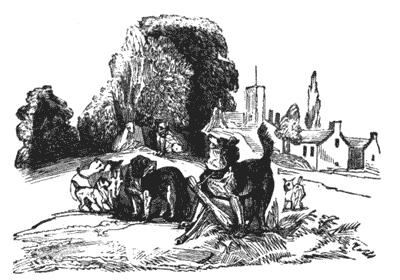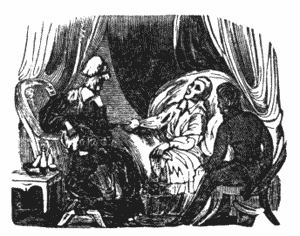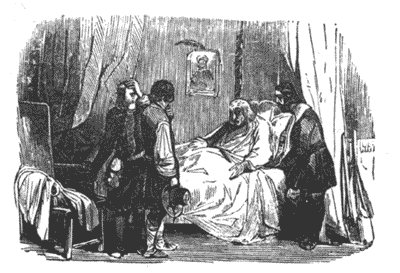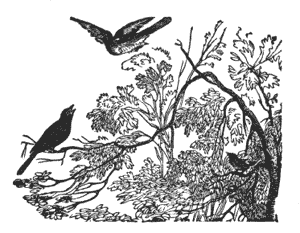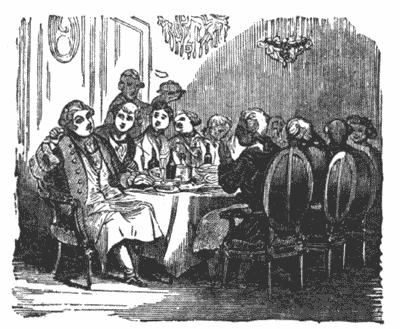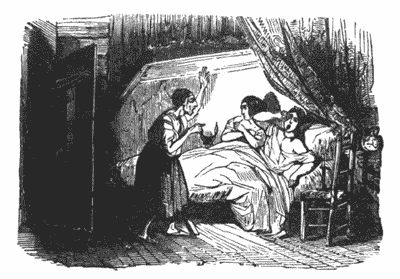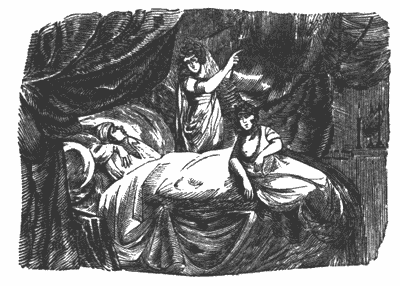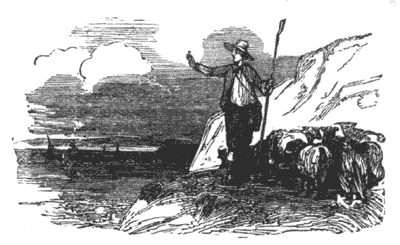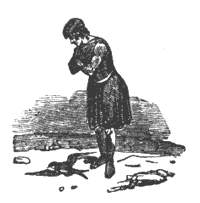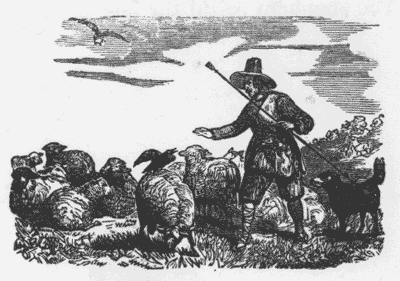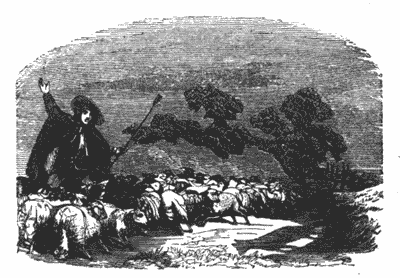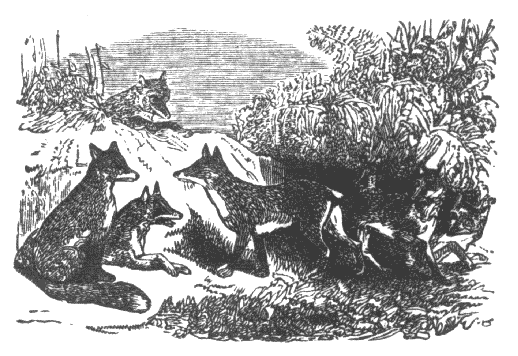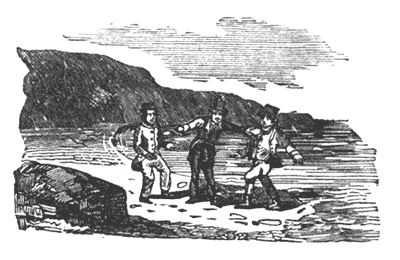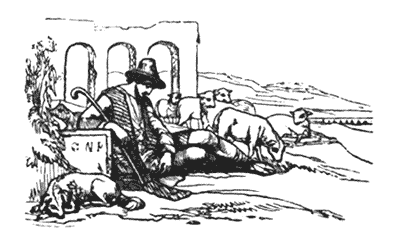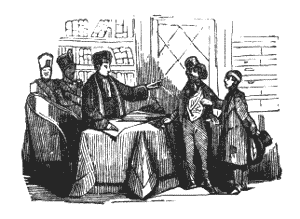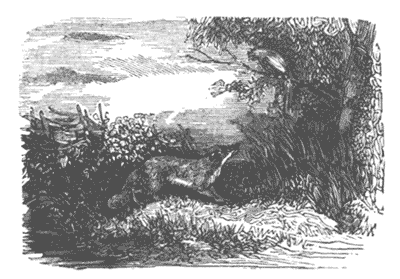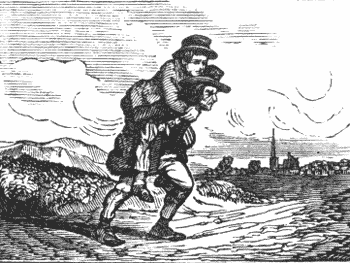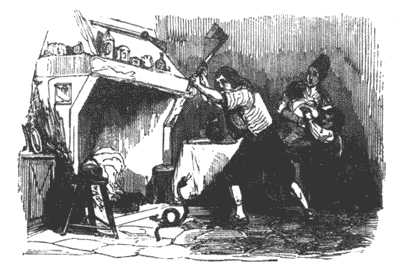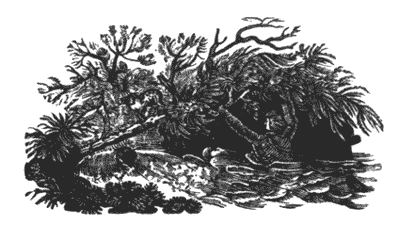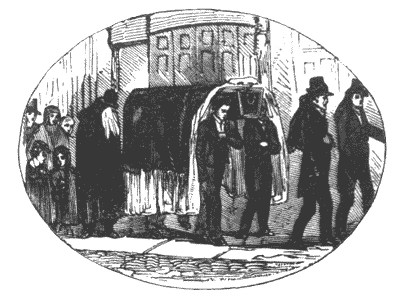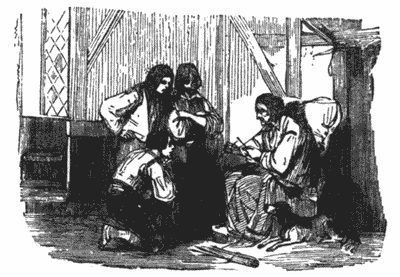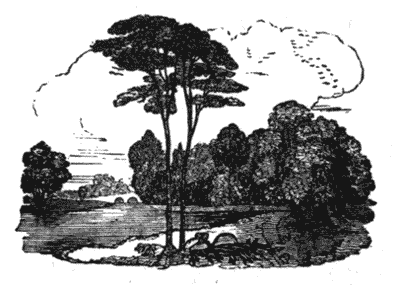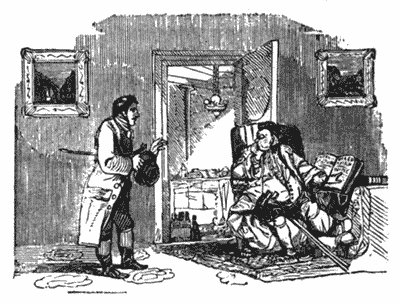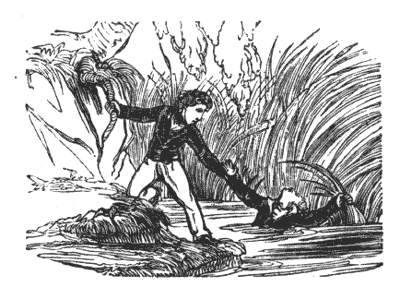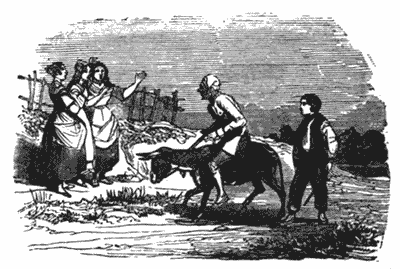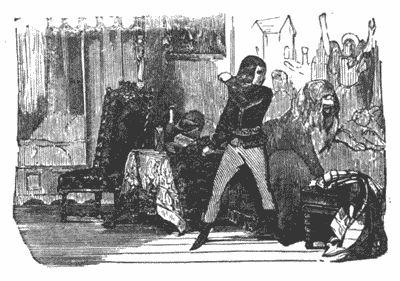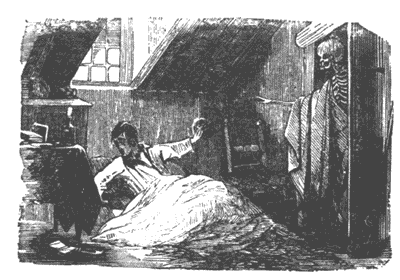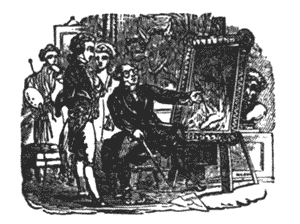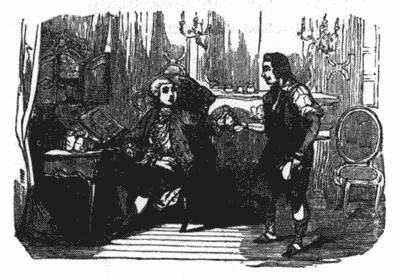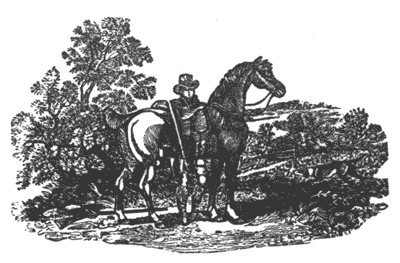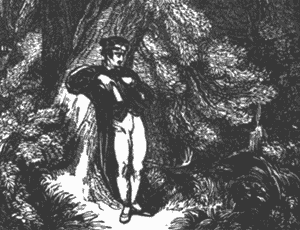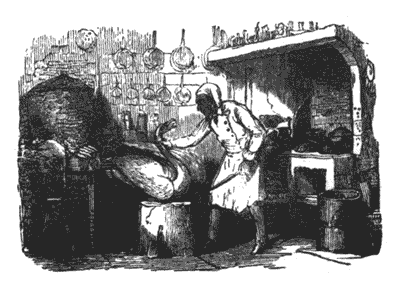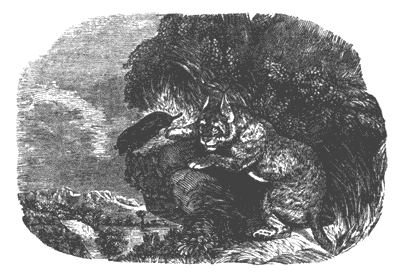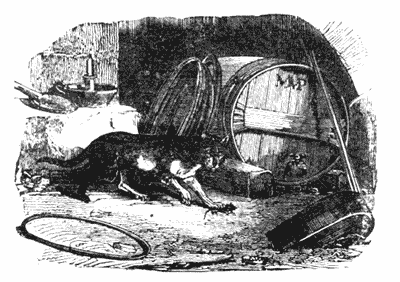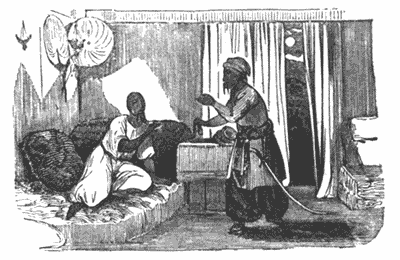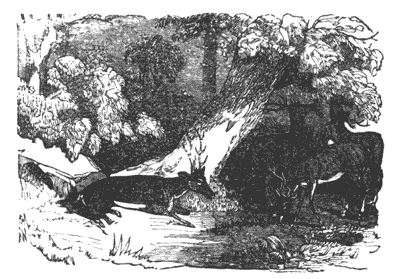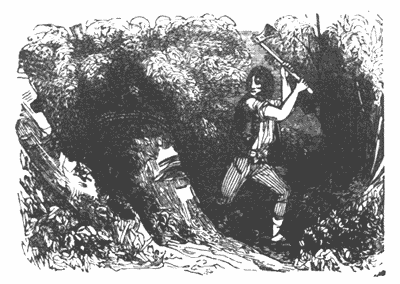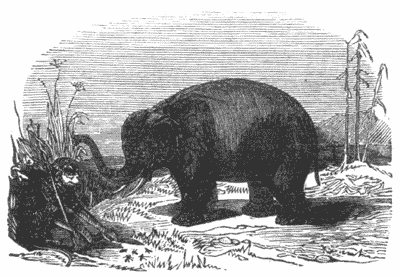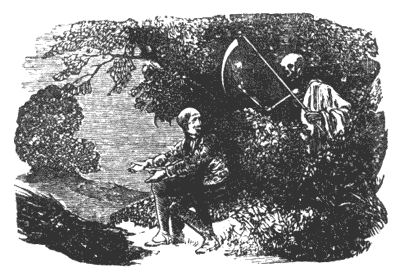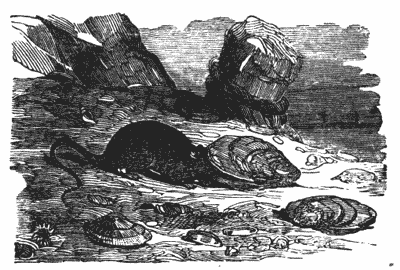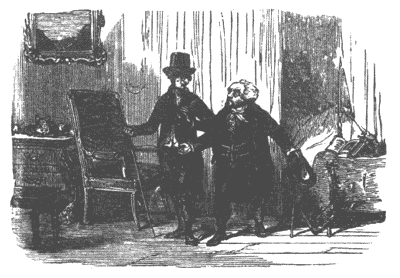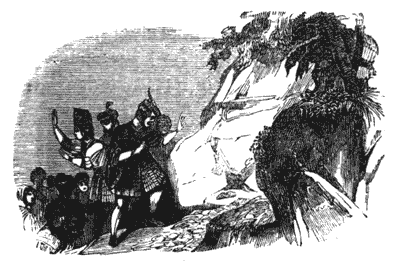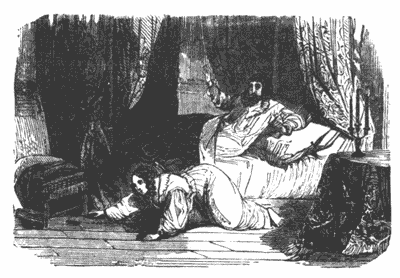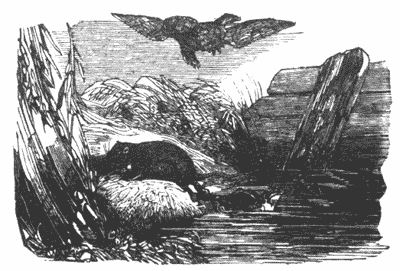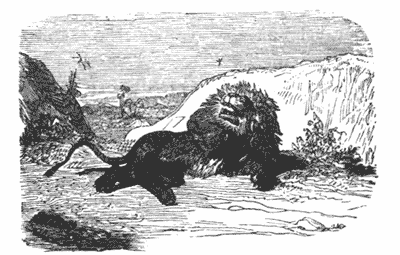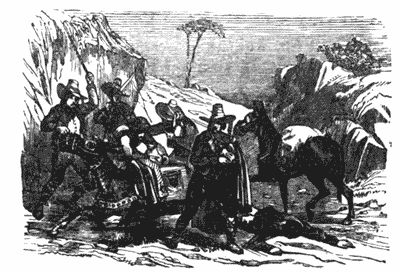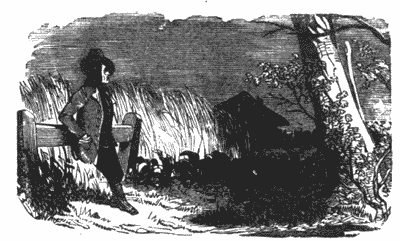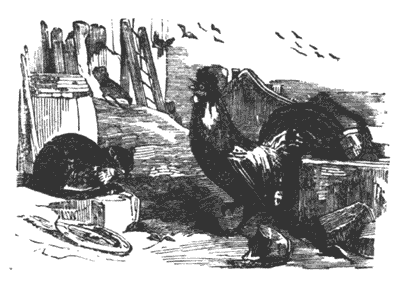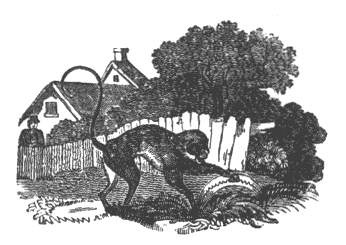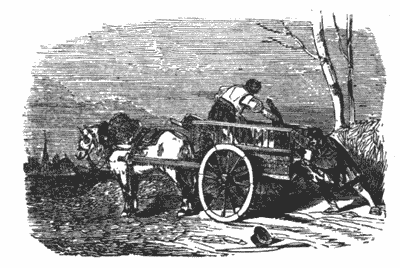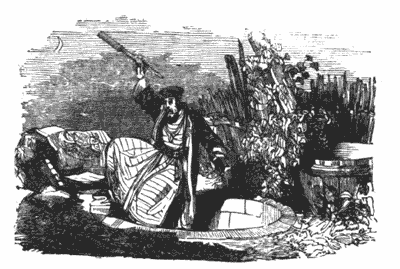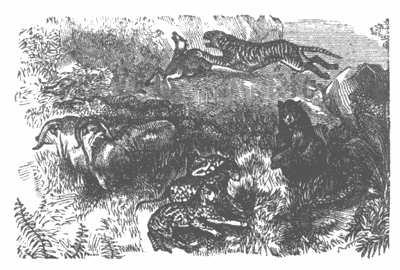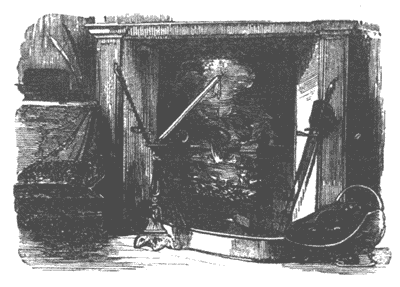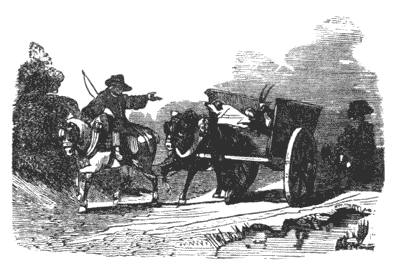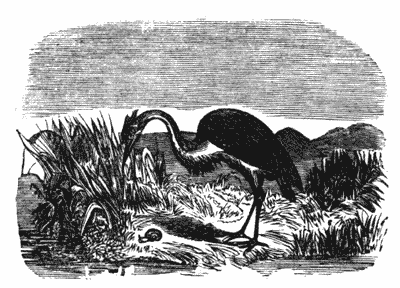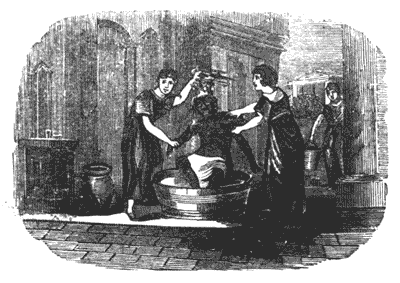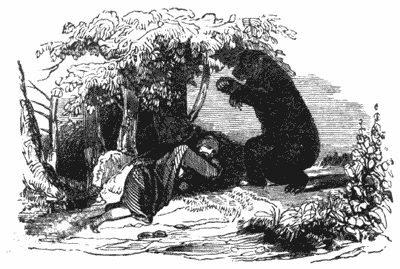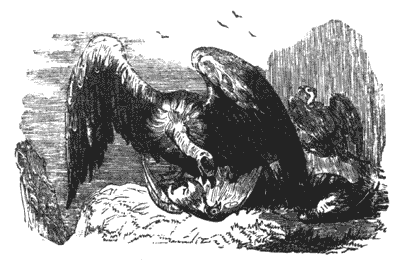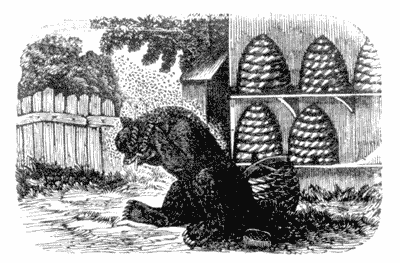
CONTENTS
- THE DOG AND THE WOLF 5
- THE HERDSMAN 8
- THE BOYS AND THE FROGS 11
- THE COCK AND THE JEWEL 13
- THE MAN AND THE LION 15
- THE FOX AND THE CRANE 18
- THE TRAVELLER AND THE SATYR 22
- THE TRAVELLERS AND THE PURSE 25
- THE MOUTH AND THE LIMBS 27
- THE HARE AND THE TORTOISE 31
- THE MILKMAID 34
- THE LARK AND HER YOUNG ONES 39
- THE PHILOSOPHER AND THE ACORN 43
- THE WOLF AND THE CRANE 45
- THE DOG AND THE SHADOW 48
- THE TRAVELLERS AND THE BEAR 50
- THE FROGS AND THE BULL 52
- THE COUNCIL OF MICE 54
- THE WOLF AND THE LAMB 57
- THE BEASTS IN PARTNERSHIP 60
- THE LION AND THE MOUSE 64
- THE JEALOUS ASS 67
- THE TOWN AND COUNTRY MICE 71
- THE FOX AND THE CROW 75
- THE LION AN THE ECHO 79
- THE PAPER KITE 82
- THE RATS AND THE CHEESE 85
- AURELIA AND THE SPIDER 88
- THE REDBREAST AND THE SPARROW 90
- THE POET AND THE COBWEBS 92
- THE EPICURE AND THE PHYSICIAN 96
- THE FROGS DESIRING A KING 101
- THE HARE AND THE BRAMBLE 104
- THE HORSE AND THE STAG 106
- THE CAT AND THE OLD MOUSE 108
- THE FOX AND THE VISOR MASK 110
- THE GOOSE THAT LAID THE GOLDEN EGGS 112
- THE FOX AND THE GRAPES 114
- THE MOUSE AND THE WEASEL 116
- THE MISER AND HIS TREASURE 118
- THE JACKDAW AND THE PEACOCKS 120
- THE SPARROW AND THE HARE 122
- THE ASS AND THE LION 123
- THE STAG AND THE FOUNTAIN 125
- THE EAGLE, THE CAT, AND THE SOW 127
- THE EAGLE, THE RAVEN AND THE TORTOISE 129
- THE FLAY AND THE HORSE 131
- ESOP AT PLAY 132
- THE OLD PILOT AND THE SAILORS 134
- THE CRAB AND HER DAUGHTER 135
- THE SUN AND THE WIND 137
- THE TWO POTS 139
- HERCULES AND THE CARTER 141
- THE ANT AND THE GRASSHOPPER 142
- THE CROW AND THE PITCHER 144
- THE ANGLER AND THE LITTLE FISH 145
- THE FROG AND THE FOX 146
- THE APE AND HR YOUNG ONES 147
- THE FIR TREE AND THE THORN 149
- THE ASS IN THE LION'S SKIN 151
- THE DOG IN THE MANGER 153
- THE STAG AND THE VINE 154
- THE FIR MISCHIEVOUS DOG 155
- THE SICK MAN AND THE PHYSICIAN 156
- THE FARMER AND HIS SONS 158
- THE SWALLOW AND THE BIRDS 160
- THE BOASTING TRAVELLER 162
- THE OLD WOMAN AND HER MAIDS 164
- THE FIR INDUSTRY AND SLOTH 166
- THE SHEPHERD TURNED MERCHANT 168
- THE SPENDTHRIFT AND THE SWALLOW 170
- THE EAGLE AND THE CROW 171
- THE WOLF AND THE SHEPHERD'S BOY 173
- THE FOX WITHOUT A TAIL 175
- THE MEN AND THE OYSTER 177
- THE SHEPHERD AND HIS DOG 179
- THE COUNTRYMAN AND THE JUSTICE 181
- THE COCK AND THE FOX 183
- THE BLIND MAN AND THE LAME 185
- THE MAN AND THE SERPENT 187
- THE TWO STREAMS 189
- THE SOT AND HIS WIFE 191
- THE FARMER AND HIS QUARRELSOME SONS 193
- THE FIG TREE AND THE FLOWERING SHRUB 195
- THE FARMER AND THE LANDLORD 197
- THE SCHOOL-BOY AND THE MONITOR 199
- THE MILLER AND HIS ASS 201
- THE DREAMER AND HIS SONS 204
- THE OLD MAN AND DEATH 206
- THE PAINTER 209
- THE COBBLER AND THE NABOB 212
- THE HORSE AND HIS RIDER 215
- THE GOOD MINISTER 219
- THE SWAN AND THE COOK 221
- THE LYNX AND THE MOLE 223
- THE OLD CAT AND THE YOUNG MOUSE 225
- THE TWO FRIENDS 227
- THE SICK STAG 230
- THE FOREST AND THE WOODMAN 232
- THE ELEPHANT AND THE MONKEY OF JUPITER 234
- THE WOODCUTTER AND DEATH 237
- THE RAT AND THE OYSTER 239
- THE PHYSICIANS 242
- THE MOUNTAIN IN LABOR 244
- THE CAT METAMORPHOSED INTO A WOMAN 246
- THE FROG AND THE RAT 248
- THE LION AND THE FLY 251
- THE TWO MULES 253
- THE JUPITER AND THE FARMER 255
- THE COCK, THE CAT, AND THE LITTLE MOUSE 258
- THE MONKEY 261
- THE HORSE AND THE ASS 263
- THE ASTROLOGER WHO FELL INTO A WELL 265
- THE ANIMALS SICK WITH THE PLAGUE 269
- THE CANDLE 273
- THE HOG, THE GOAT, AND THE SHEEP 275
- THE DELICATE HERON 278
- THE BLACKAMOOR AND HER MISTRESS 280
- THE BEAR AND THE GARDENER 282
- THE VULTURES AND THE PIGEONS 284
- THE BEAR AND THE BEES 287
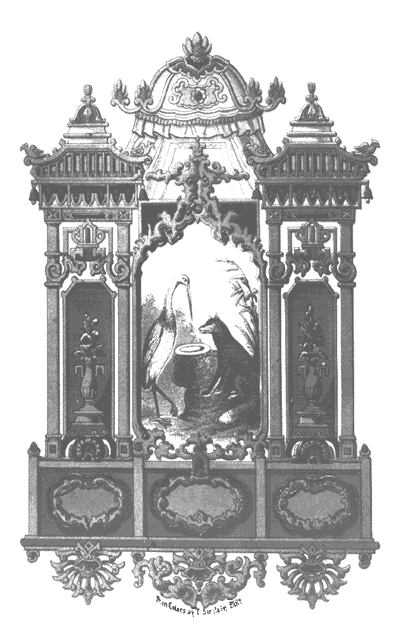
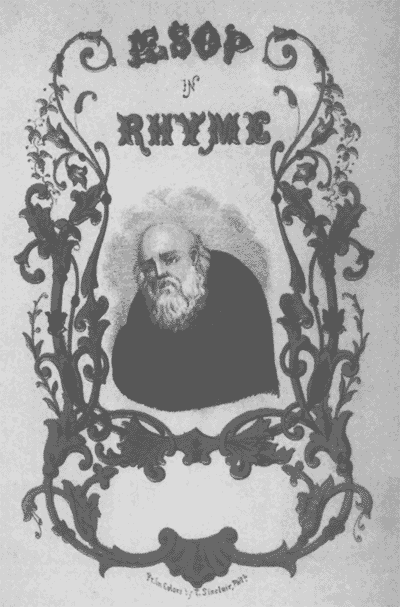
ÆSOP,
IN RHYME;
OR,
OLD FRIENDS IN A NEW DRESS.
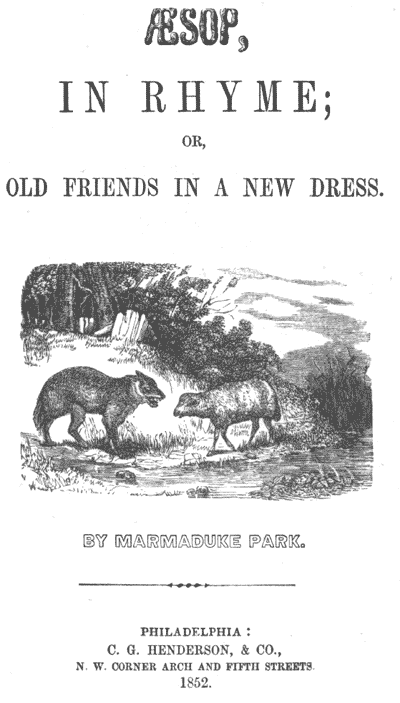
BY MARMADUKE PARK.
PHILADELPHIA:
C. G. HENDERSON, & CO.,
N. W. CORNER ARCH AND FIFTH STREETS.
1852.
Entered according to Act of Congress, in the year 1852,
BY C. G. HENDERSON & CO.,
in the Clerk's Office of the District Court of the United States, in and for the Eastern District of Pennsylvania.
[5]THE DOG AND THE WOLF.
A wolf there was, whose scanty fare
Had made his person lean and spare;
A dog there was, so amply fed,
His sides were plump and sleek; 'tis said
The wolf once met this prosp'rous cur,
And thus began: "Your servant, sir;
[6]I'm pleased to see you look so well,
Though how it is I cannot tell;
I have not broke my fast to-day;
Nor have I, I'm concern'd to say,
One bone in store or expectation,
And that I call a great vexation."
"Indeed it is," the dog replied:
"I know no ill so great beside;
But if you do not like to be
So poorly fed, come live with me."
"Agreed," rejoined the wolf, "I'll go:
But pray, what work am I to do?"
"Oh, guard the house, and do not fail
To bark at thieves, and wag your tail."
So off they jogg'd, and soon arrived
At where the friendly mastiff lived.
"Well," said the wolf, "I can't deny
You have a better house than I."
"Not so," the other then replied,
"If you with me will hence abide."
"Oh," said the wolf, "how kind you are!
But what d'ye call that, hanging there?
[7]Is it an iron chain, or what?"
"Friend," said the dog, "I quite forgot
To mention that; sometimes, you see,
They hook that little chain to me;
But it is only meant to keep
Us dogs from walking in our sleep,
And should you wear it, you would find,
It's nothing that you need to mind."
"I'll take your word," the wolf replied.
"It's truth by me shall ne'er be tried;
I'll have my liberty again,
And you your collar and your chain."
MORAL.
Our neighbors sometimes seem to be
A vast deal better off than we;
Yet seldom 'tis they really are,
Since they have troubles too to bear,
Which, if the truth were really known,
Are quite as grievous as our own.
THE HERDSMAN.
A herdsman, who lived at a time and a place
Which, should you not know, is but little disgrace,
Discover'd one morning, on counting his stock,
That a sheep had been stolen that night from the flock.
[9]"Oh, I wish I had caught ye, whoever ye be,
I'd have soon let you know, I'd have soon let ye see,
What he had to expect," said the herdsman, "I trow;
But I've thought of a scheme that will trouble you now."
So what did he do, sir, but put up a board,
Describing the thief, and proposed a reward
Of a lamb, to the man who would give information
Concerning the thief, and his true designation.
The project succeeded; for soon there applied
A certain near neighbor, with others beside.
"But tell me the thief," said the herdsman, "at least;"
"Come hither," said they, "and we'll show you the beast!"
[10]"The beast!" said the rustic, who thought he should die on
The spot, when he found that the thief was a lion!
"Ill luck to my hurry, what now shall I do?
I promised a lamb to detect you 'tis true;
But now I'd consent all my substance to pay,
If I could but with safety get out of your way."
MORAL.
Silly people ask things that would ruin, if sent;
They demand them in haste, and at leisure repent.
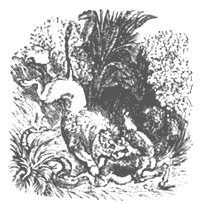
THE BOYS AND THE FROGS.
Some boys, beside a pond or lake,
Were playing once at duck and drake?
When, doubtless to their heart's content,
Volleys of stones were quickly sent.
But there were some (there will be such)
Who did not seem amused so much;
[12]These were the frogs, to whom the game,
In point of sport was not the same.
For scarce a stone arrived, 'tis said,
But gave some frog a broken head;
And scores in less than half an hour,
Perished beneath the dreadful shower.
At last, said one, "You silly folks, I say,
Do fling your stones another way;
Though sport to you, to throw them thus,
Remember, pray, 'tis death to us!"
MORAL.
From hence this moral may be learn'd:
Let play be play to all concern'd.
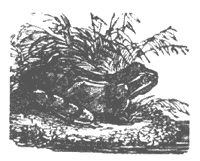
THE COCK AND THE JEWEL.
A cock there was: a sage was he
(If Esop we may trust,)
Who wish'd to make a meal, you see,
As other sages must.
With this intent, as heretofore,
When on the hunt for grain;
Our hero scratch'd the litter o'er
With all his might and main.
[14]But scarce a minute had he scratch'd,
When, to his great surprise,
A gem, with golden chain attach'd,
He saw with both his eyes.
"Alack!" quoth he, "what have we here?
A diamond, I protest!
Which lords and ladies buy so dear,
And hold in such request.
"But one good barley-corn to me
Has more intrinsic worth
Than all the pearls now in the sea,
Or gold now in the earth."
MORAL.
The moral here, in Esop's mind,
Was this, there's not a doubt:
Things have most value, which we find
We cannot do without.
THE MAN AND THE LION.
A man and a lion once had a dispute,
Which was reckon'd the greatest, the man or the brute;
The lion discoursed on his side at some length,
And greatly enlarged on his courage and strength.
[16]The man, one would think, had enough to reply
On his side the question, which none could deny;
But like many others who make a pretence,
He talk'd perfect nonsense, and thought it good sense.
"So," says he, "don't be prating,—look yonder, I pray,
At that sculpture of marble, now what will you say?
The lion is vanquished; but as for the man
He is striding upon him; deny it who can."
"But pray," said the lion, "who sculptured that stone?"
"One of us," said the man, "I must candidly own."
"But when we are sculptors," the other replied,
"You will then on the man see the lion astride."
[17]MORAL.
The man might have added, if he had been wise,
"But a beast cannot sculpture a stone, if he tries."
That sufficiently shows where the difference lies.
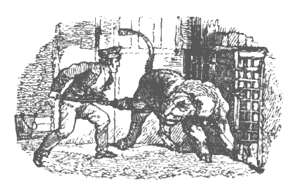
THE FOX AND THE CRANE.
"I certainly think," said a fox to a crane,
"That face, ma'am of yours is remarkably plain;
That beak that you wear is so frightful a feature,
It makes you appear a most singular creature."
The crane, much offended at what she had heard,
March'd off at full speed, without saying a word:
[19]"Oh dear!" said the fox, "Mrs. Crane, I protest
You misunderstand me, 'twas only a jest."
"Come, don't be affronted—stay with me and dine;
You know very well 'tis this temper of mine
To say such odd things to my intimate friends;
But you know that poor Reynard no mischief intends."
So the crane thought it best not to break with him quite,
But to view his remarks in a good-natured light.
So she put on as pleasant a face as she could
When he ask'd her to dine, and replied that she would.
But alas! she perceived that his jokes were not over,
When Reynard removed from the victuals its cover
[20]'Twas neither game, butcher's meat, chicken, not fish;
But plain gravy-soup, in a broad shallow dish.
Now this the fox lapp'd with his tongue very quick,
While the crane could scarce dip in the point of her beak;
"You make a poor dinner," said he to his guest;
"Oh, dear! by no means," said the bird, "I protest."
But the crane ask'd the fox on a subsequent day,
When nothing, it seems, for their dinner had they
But some minced meat served up in a narrow-neck'd jar;
Too long, and narrow, for Reynard by far.
"You make a poor dinner, I fear," said the bird;
"Why, I think," said the fox, "'twould be very absurd
[21]To deny what you say, yet I cannot complain,
But confess, though a fox, that I'm matched by a crane."
MORAL.
Cunning folks who play tricks which good manners condemn,
Often find their own tricks play'd again upon them.
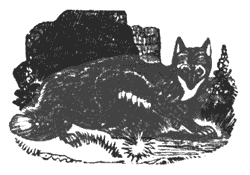
THE TRAVELLER AND THE SATYR.
A luckless wight, in winter slow,
Travelling once a forest through
Cold and hungry, tired and wet,
Began in words like these to fret:
"Oh, what a sharp inclement day!
And what a dismal, dreary way!
No friendly cot, no cheering fields,
No food this howling forest yields;
[23]I've nought in store or expectation!
There's nought before me but starvation."
"Not quite so bad," a voice replied;
Quickly the traveller turned aside,
And saw the satyr of the wood,
Who close beside his dwelling stood.
"Here is my cave hard by," said he,
"Walk in, you're welcome, pray be free."
The traveller did not hesitate,
Hoping for something good to eat,
But follow'd to his heart's content,
Blowing his finger as he went.
"Pray," said the satyr, "may I know
For what you blow your fingers so?"
"What! need you," said the man, "be told?—
To warm my fingers, 'numb'd with cold."
"Indeed!" was all his host replied,
Intent some pottage to provide,
Which heated well, with spice infused,
Was to his shivering guest produced:
[24]So hot it was, as Esop sung,
It made our traveller scald his tongue;
And wishing not again to do it,
Our hero could not wait, but blew it.
"What?" said his host, in accent rough,
"Is not your pottage hot enough?"
"Yes," said the man, "full well I know it,
'Tis far too hot, that's why I blow it."
"You artful villain! do you so?"
His host replied, with angry brow;
"My cave shall not a moment hold
A man that blows both hot and cold!
By none but rogues can that be done,
You double-dealing wretch, begone!"
MORAL.
The traveller scarce deserved such wrath,
For warming fingers—cooling broth.
No statutes old or new forbid it,
Although with the same mouth he did it:
Yet this beware of old and young,
What Esop meant—a double tongue;
Which flatters now with civil clack,
And slanders soon behind one's back.
THE TRAVELLERS AND THE PURSE.
Two friends once were walking in sociable chat,
When a purse one espied on the ground;
"Oh, see!" said he, (thank my fortune for that,)
"What a large sum of money I've found!"
[26]"Nay, do not say I" said his friend, "for you know
'Tis but friendship to share it with me;"
"I share it with you," said the other. "How so?
He who found it the owner should be."
"Be it so," said his friend, "but what sound do I hear?
'Stop thief!' one is calling to you;
He comes with a constable close in the rear!"
Said the other, "Oh, what shall we do?"
"Nay, do not say we," said his friend, "for you know
You claimed the sole right to the prize!
And since all the money was taken by you,
With you the dishonesty lies."
MORAL.
When people are selfish, dishonest, and mean,
Their nature, in dealing, will quickly be seen.
THE MOUTH AND THE LIMBS.
In days of yore, they say, 'twas then
When all things spoke their mind;
The arms and legs of certain men,
To treason felt inclined.
These arms and legs together met,
As snugly as they could,
With knees and elbows, hands and feet,
In discontented mood.
[28]Said they, "'Tis neither right nor fair,
Nor is there any need,
To labor with such toil and care,
The greedy mouth to feed."
"This we're resolved no more to do,
Though we so long have done it;"
"Ah!" said the knees and elbows too,
"And we are bent upon it."
"I," said the tongue, "may surely speak,
Since I his inmate am;
And for his vices while you seek,
His virtues I'll proclaim.
"You say the mouth embezzles all,
The fruit of your exertion;
But I on this assembly call
To prove the base assertion.
"The food which you with labor gain,
He too with labor chews;
Nor does he long the food retain,
But gives it for your use.
[29]"But he his office has resign'd
To whom you may prefer;
He begs you therefore now to find
Some other treasurer."
"Well, be it so," they all replied;
"His wish shall be obeyed;
We think the hands may now be tried
As treasurers in his stead."
The hands with joy to this agreed,
And all to them was paid;
But they the treasure kept indeed,
And no disbursements made.
Once more the clam'rous members met,
A lean and hungry throng;
When all allowed, from head to feet,
That what they'd done was wrong.
To take his office once again,
The mouth they all implored;
Who soon accepted it, and then
Health was again restored.
[30]MORAL.
This tale for state affairs is meant,
Which we need not discuss;
At present we will be content,
To find a moral thus:
The mouth has claims of large amount,
From arms, legs, feet, and hands;
But let them not, on that account,
Pay more than it demands.
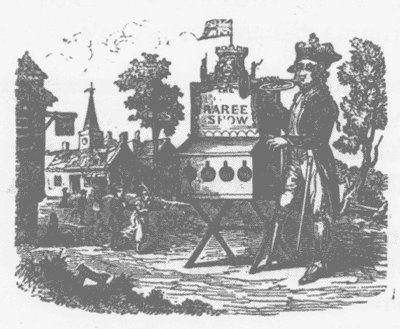
THE HARE AND THE TORTOISE.
Said a hare to a tortoise, "Good sir, what a while
You have been only crossing the way;
Why I really believe that to go half a mile,
You must travel two nights and a day."
"I am very contented," the creature replied,
"Though I walk but a tortoise's pace,
[32]But if you think proper the point to decide,
We will run half a mile in a race."
"Very good," said the hare; said the tortoise, "Proceed,
And the fox shall decide who has won,"
Then the hare started off with incredible speed;
But the tortoise walk'd leisurely on.
"Come tortoise, friend tortoise, walk on," said the hare,
"Well, I shall stay here for my dinner;
Why, 'twill take you a month, at that rate, to get there,
Then how can you hope to be winner?"
But the tortoise could hear not a word that she said
For he was far distant behind;
So the hare felt secured while at leisure she fed,
And took a sound nap when she dined.
[33]So at last this slow walker came up with the hare,
And there fast asleep did he spy her;
And he cunningly crept with such caution and care,
That she woke not, although he pass'd by her.
"Well now," thought the hare, when she open'd her eyes,
"For the race,—and I soon shall have done it;"
But who can describe her chagrin and surprise,
When she found that the tortoise had won it!
MORAL.
Thus plain plodding people, we often shall find,
Will leave hasty confident people behind.
THE MILKMAID.
A milkmaid, who poized a full pail on her head,
Thus mused on her prospects in life, it is said:
"Let's see—I should think that this milk will procure
One hundred good eggs, or fourscore to be sure.
[35]"Well then—stop a bit,—it must not be forgotten,
Some of these may be broken, and some may be rotten;
But if twenty for accidents should be detach'd,
It will leave me just sixty sound eggs to hatch'd.
"Well, sixty sound eggs—no; sound chickens, I mean;
Of these some may die—we'll suppose seventeen—
Seventeen!—not so many—say ten at the most,
Which will leave fifty chickens to boil or to roast.
"But then there's their barley; how much will they need?
Why they take but one grain at a time when they feed,
[36]So that's a mere trifle; now then let us see,
At a fair market price, how much money there'll be?
"Six shillings a pair—five—four—three-and-six,
To prevent all mistakes, that low price I will fix;
Now what will that make? fifty chickens, I said,
Fifty times three-and-sixpence—I'll ask brother Ned.
"Oh! but stop—three-and-sixpence a pair I must sell 'em;
Well, a pair is a couple—now then let us tell 'em;
A couple in fifty will go—(my poor brain!)
Why just a score times, and five pair will remain.
"Twenty-five pair of fowls—now how shameful it is,
That I can't reckon up as much money as this!
[37]Well, there's no use in trying; so let's give a guess;
I will say twenty pounds, and it can't be no less.
"Twenty pounds, I am certain, will buy me a cow,
Thirty geese, and two turkeys—eight pigs and a sow;
Now if these turn out well, at the end of the year,
I shall fill both my pockets with guineas 'tis clear.
"Then I'll bid that old tumble-down hovel good-bye;
My mother she'll scold, and my sisters they'll cry:
But I won't care a crow's egg for all they can say;
I sha'n't go to stop with such beggars as they!"
But forgetting her burden, when this she had said,
The maid superciliously toss'd up her head
[38]When alas! for her prospects—the milk pail descended!
And so all her schemes for the future were ended.
MORAL.
This moral, I think, may be safely attach'd:
Reckon not on your chickens before they are hatch'd.
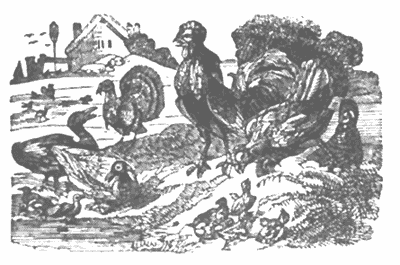
THE LARK AND HER YOUNG ONES.
A lark who had her nest conceal'd,
Says Esop, in a barley field;
Began, as harvest time drew near,
The reaping of the corn to fear;
Afraid they would her nest descry,
Before her tender brood could fly.
She charged them therefore every day,
Before for food she flew away,
To watch the farmer in her stead,
And listen well to all he said.
[40]It chanced one day, she scarce was gone,
Ere the farmer came and his son.
The farmer well his field survey'd,
And sundry observations made;
At last, "I'll tell you what," said he,
"This corn is fit to cut, I see;
But we our neighbor's help must borrow,
So tell them we begin to-morrow."
Just after this the lark returned,
When from her brood this news she learned.
"Ah! dearest mother," then, said they,
"Pray, let us all begone to-day."
"My dears," said she, "you need not fret,
I shall not be uneasy yet;
For if he waits for neighbor's aid,
The business long will be delay'd."
At dawn she left her nest once more,
And charged her young ones as before.
At five the farmer came again,
And waited for his friends in vain,
[41]"Well," said the man, "I fancy, son,
These friends we can't depend upon;
To-morrow early, mind you go,
And let our own relations know."
Again the lark approach'd her nest,
When round her all her young ones press'd,
And told their mother, word for word,
The fresh intelligence they heard.
"Ah, children, be at ease," said she
"We're safe another day, I see;
For these relations, you will find,
Just like his friends, will stay behind."
At dawn again the lark withdrew,
And did again her charge renew.
Once more the farmer early came,
And found the case was just the same.
The day advanced, the sun was high;
But not a single help drew nigh.
Then said the farmer, "Hark ye, son—
I see this job will not be done,
[42]While thus we wait for friends and neighbors;
So you and I'll commence our labors:
To-morrow early, we'll begin
Ourselves, and get our harvest in."
"Now," said the lark, when this she heard,
"Our movement must not be deferr'd;
For if the farmer and his son
Themselves begin, 'twill soon be done."
The morrow proved the lark was right;
For all was cut and housed by night.
MORAL.
Hence, while we wait for other's aid,
Our business needs must be delay'd;
Which might be done with half the labor
'Twould take to go and call a neighbor.
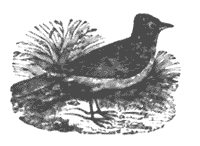
THE PHILOSOPHER AND THE ACORN.
A philosopher, proud of his wit and his reason,
Sat him under an oak in a hot summer season.
On the oak grew an acorn or two, it is said:
On the ground grew a pumpkin as big as his head.
Thought the sage, "What's the reason this oak is so strong
A few acorns to bear that are scarce an inch long;
[44]While this poor feeble plant has a weight to sustain,
Which had much better hang on the tree, it is plain?"
But just at the time the philosopher spoke
An acorn dropp'd down on his head from the oak;
Then, said he, who just now thought his plan was so clever,
"I am glad that this was not a pumpkin, however."
MORAL.
The sage would no doubt have looked grievously dull,
Had a pumpkin descended with force on his scull.
Of his folly then let us in future beware,
And believe that such matters are best as they are:
Leave the manners and customs of oak trees alone,
Of acorns, and pumpkins—and look to our own.
THE WOLF AND THE CRANE.
A wolf, once forgetting the size of his swallow,
Tried to pass a large marrow-bone through it.
"Oh dear," said the beast, thinking death was to follow,
"How careless and stupid to do it!"
His mouth was propp'd open by means of the bone,
And his breathing was greatly impeded,
[46]But a crane coming up, he contrived to make known
What kind of assistance he needed.
"How d'ye do?" said the bird; said the beast, "Very ill,
For a bone has gone down the wrong way;
But if you can extract it by means of your bill,
The service I'll amply repay."
Thought the crane, "I'm no surgeon: yet all must agree,
That my bill will make excellent forceps;
And as for the money, I do not now see
Why I need refuse taking his worship's."
Said the bird, "It's agreed;" said his patient, "Proceed,
And take the bone hence, I beseech;"
Which, after awhile, and with infinite toil,
The crane at last managed to reach.
[47]"Thank my stars!" said the beast, from his terrors released,
"Thank you too, sir," said he to the bird;
"Alas!" said the crane, "is this all I'm to gain,
I was waiting the promised reward."
Said the wolf, "You forget, I've contracted no debt,
Since the service was rendered by me;
Your head I releas'd from the jaws of a beast,
And now you're demanding a fee!"
MORAL.
Give your help to a wolf, should he beg for your aid,
But you must not expect when you've done to be paid.
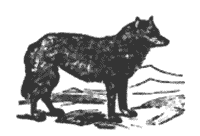
THE DOG AND THE SHADOW.
A dog growing thinner, for want of a dinner,
Once purloined him a joint from a tray,
"How happy I am, with this shoulder of lamb,"
Thought the cur as he trotted away.
But the way that he took, lay just over a brook,
Which he found it was needful to cross;
[49]So without more ado, he plunged in to go through,
Not dreaming of danger or loss.
But what should appear, in this rivulet clear,
As he thought upon coolest reflection,
But a cur like himself, who with ill-gotten pelf,
Had run off in that very direction.
Thought the dog, a propos! but that instant let go
(As he snatched at this same water-spaniel)
The piece he possess'd:—so with hunger distress'd
He slowly walk'd home to his kennel.
MORAL.
Hence, when we are needy, don't let us be greedy,
(Excuse me this line of digression,)
Lest in snatching at all, like the dog, we let fall
The good that we have in possession.
THE TRAVELLERS AND THE BEAR.
Two trav'llers one morning set out from their home,
It might be from Sparta, from Athens, or Rome;
It matters not which, but agreed, it is said,
Should danger arise, to lend each other aid.
But scarce was this done, when forth rushing amain,
Sprung a bear from a wood tow'rds these travellers twain;
[51]Then one of our heroes, with courage immense,
Climb'd into a tree, and there found his defence.
The other fell flat to the earth with dread,
When the bear came and smelt him, and thought he was dead;
So not liking the carcase, away trotted he,
When straight our brave hero descended the tree.
Then, said he, "I can't think what the bear could propose,
When so close to your ear, he presented his nose."
"Why this," said the other, "he told me to do,
To beware for the future of cowards like you."
MORAL.
Those people who run from their friends in distress,
Will be left when themselves are in trouble, I guess.
THE FROGS AND THE BULL.
A Bull once treading near a bog,
Displaced the entrails of a frog,
Who near his foot did trust them;
In fact, so great was the contusion,
And made of his inwards such confusion,
No art could re-adjust them.
It chanced that some who saw his fate,
Did to a friend the deed relate,
[53]With croakings, groans, and hisses;
"The beast," said they, "in size excell'd
All other beasts," their neighbors swell'd,
And ask'd, "as large as this is!"
"Oh, larger far than that," said they,
"Do not attempt it, madam, pray;"
But still the frog distended,
And said, "I'll burst, but I'll exceed,"
She tried, and burst herself indeed!
And so the matter ended.
MORAL.
Should you with pride inflate and swell,
As did the frog: then who can tell!
Your sides may crack, as has been shown,
And we with laughing crack our own.
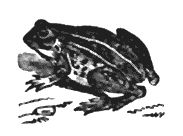
THE COUNCIL OF MICE.
Some mice who saw fit, once a quarter to meet,
To arrange the concerns of their city;
Thought it needful to choose, as is common with us,
First a chairman, and then a committee.
When the chairman was seated, the object he stated
For which at that meeting they sat:
[55]Which was, it should seem, the concerting a scheme
To defeat the designs of the cat.
Dr. Nibblecheese rose, and said, "I would propose,
To this cat we fasten a bell;
He who likes what I've said, now will hold up his head;
He who does not, may hold up his tail."
So out of respect, they their noses erect,
Except one who the order reversed;
Ayes, all then but one, but yet nought could be done,
Until he had his reasons rehearsed.
"I shall not," said this mouse, "waste the time of the house,
In long arguments; since, as I view it,
The scheme would succeed without doubt, if indeed
We could find any mouse who would do it."
[56]"Hear! hear!" was the cry, and "no bells we will try,
Unless you will fasten them on;"
So quite broken-hearted the members departed,
For the bill was rejected nem. con.
MORAL.
Then be not too hasty in giving advice,
Lest your schemes should remind of the council of mice;
You had better delay your opinion a year,
Than put forth a ridiculous one, it is clear.
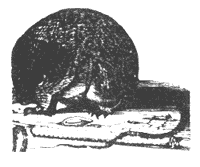
THE WOLF AND THE LAMB.
A wolf and lamb once chanced to meet,
Beside a stream, whose waters sweet
Brought various kinds of beasts together,
When dry and sultry was the weather;
Now though the wolf came there to drink,
Of eating, he began to think,
As soon as near the lamb he came,
And straight resolved to kill the same;
[58]Yet thought it better to begin,
With threat'ning words and angry mien.
"And so," said he, to him below,
"How dare you stir the water so?
Making the cool refreshing flood,
As brown as beer, and thick as mud."
"Sir," said the lamb, "that cannot be,
The water flows from you to me;
So, 'tis impossible, I think,
That what I do can spoil your drink."
"I say it does, you saucy puss:
How dare you contradict me thus;
But more than this, you idle clack,
You rail'd at me behind my back
Two years ago, I have been told;"
"How so? I'm not a twelvemonth old,"
The lamb replied; "So I suspect
Your honor is not quite correct."
"If not, your mother it must be,
And that comes all the same to me,"
Rejoined the wolf—who waited not
But kill'd and ate him on the spot.
[59]MORAL.
Some, like the wolf, adopt the plan,
To make a quarrel if they can;
But none with you can hold dispute,
If you're determined to be mute;
For sure this proverb must be true,
That ev'ry quarrel must have two.
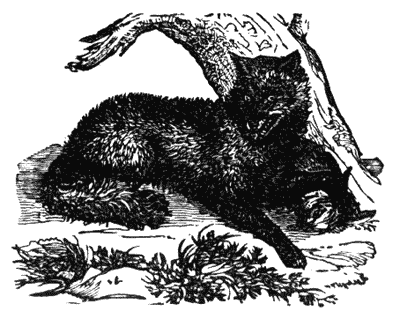
THE BEASTS IN PARTNERSHIP.
This firm once existed, I'd have you to know,
Messrs. Lion, Wolf, Tiger, Fox, Leopard, and Co.;
These in business were join'd, and of course 'twas implied,
They their stocks should unite, and the profits divide.
[61]Now the fable relates, it so happened one day,
That their efforts combined, made a bullock their prey:
But agreed that the Lion should make the division,
And patiently waited the monarch's decision.
"My friends," said the Lion, "I've parted, you see,
The whole into six, which is right, you'll agree;
One part I may claim, as my share in the trade."
"Oh, take it and welcome," they all of them said.
"I claim too the second; since no one denies
'Twas my courage and conduct that gained you the prize:
And for the third; that you know is a fine
To the Lord of the manor, and therefore is mine."
[62]"Hey day!" said the fox; "Stop a bit," said the lion,
"I have not quite done," said he, fixing his eye on
The other three parts; "you are fully aware,
That, as tribute, one other part comes to my share.
"And I think 'twould be prudent, the next to put by
Somewhere safe in my den for a future supply,
And the other, you know, will but barely suffice,
To pay those expenses which always arise."
"If this be the case," said the fox, "I discern
That the business to us is a losing concern;
If so to withdraw, I should think would be best;"
"Oh, yes! let us break up the firm," said the rest;
[63]And so:—for you may not have heard of it yet,—
It was quickly dissolved, though not in the gazette.
MORAL.
Some folks in their dealings, like him in the fable,
Will take others' shares, if they think they are able;
But let them not wonder who act in this way,
If they find none will join them in business or play.
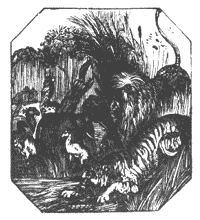
THE LION AND THE MOUSE.
A lion, with the heat oppress'd,
One day composed himself to rest;
But whilst he dozed, as he intended,
A mouse his royal back ascended;
Nor thought of harm as Esop tells,
Mistaking him for something else,
And travelled over him, and round him,
And might have left him as he found him,
[65]Had he not, tremble when you hear,
Tried to explore the monarch's ear!
Who straightway woke with wrath immense,
And shook his head to cast him thence.
"You rascal, what are you about,"
Said he, when he had turned him out.
"I'll teach you soon," the lion said,
"To make a mouse-hole in my head!"
So saying, he prepared his foot,
To crush the trembling tiny brute;
But he, the mouse, with tearful eye,
Implored the lion's clemency,
Who thought it best at least to give
His little pris'ner a reprieve.
'Twas nearly twelve months after this,
The lion chanced his way to miss;
When pressing forward: heedless yet,
He got entangled in a net.
With dreadful rage he stamp'd and tore,
And straight commenced a lordly roar;
When the poor mouse who heard the noise,
Attended, for she knew his voice.
[66]Then what the lion's utmost strength
Could not effect, she did at length:
With patient labor she applied
Her teeth, the net-work to divide;
And so at last forth issued he,
A lion, by a mouse set free.
MORAL.
Few are so small or weak, I guess,
But may assist us in distress;
Nor shall we ever, if we're wise,
The meanest, or the least, despise.
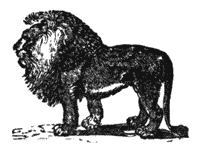
THE JEALOUS ASS.
"There lived," says friend Esop, "some ages ago,
An ass who had feelings acute, you must know;
This ass to be jealous, felt strongly inclined,
And for reasons which follow, felt hurt in his mind."
[68]It seems that his master, as I understand,
Had a favorite dog which he fed from his hand.
Nay, the dog was permitted to jump on his knee:
An honor that vex'd our poor donkey to see.
"Now," thought he, "what's the reason, I cannot see any,
That I have no favors, while he has so many?
If all this is got by just wagging his tail,
Why I have got one, which I'll wag without fail."
So the donkey resolved to try what he could do
And, determined unusual attentions to show,
When his master was dining, came into the room.
"Good sir!" said his friends, "why your donkey is come!"
[69]"Indeed!" said their host, great astonishment showing,
When he saw the ass come, while his tail was a-going;
But who can describe his dismay or fear,
When the donkey rear'd up, and bray'd loud in his ear!
"You rascal get down,—John, Edward, or Dick!
Where are you? make haste, and come here with a stick."
The man roared—the guests laugh'd—the dog bark'd—the bell rung:
Coals, poker, and tongs, at the donkey were flung,
Till the blows and the kicks, with combined demonstration,
Convinced him that this was a bad speculation;
So, mortified deeply, his footsteps retrod he,
Hurt much in his mind, but still more in his body.
[70]MORAL.
So some silly children, as stupid as may be,
Will cry for indulgences fit for a baby.
Had they enter'd the room while the donkey withdrew,
They'd have seen their own folly and punishment too:
Let them think of this fable, and what came to pass;
Nor forget, he who play'd this fine game was an ass.
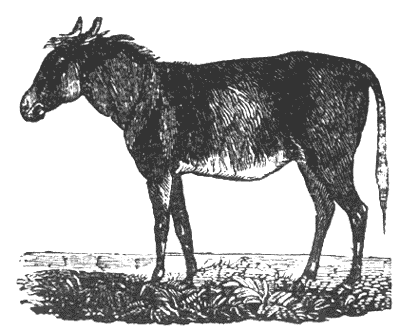
THE TOWN AND COUNTRY MICE.
A plain, but honest, country mouse,
Residing in a miller's house;
Once, on a time, invited down
An old acquaintance of the town:
And soon he brought his dainties out;
The best he had there's not a doubt.
A dish of oatmeal and green peas,
With half a candle, and some cheese;
[72]Some beans, and if I'm not mistaken,
A charming piece of Yorkshire bacon.
And then to show he was expert
In such affairs, a fine dessert
Was next produced, all which he press'd,
With rustic freedom, on his guest.
But he, the city epicure,
This homely fare could not endure
Indeed he scarcely broke his fast
By what he took, but said, at last,
"Old crony, now, I'll tell you what:
I don't admire this lonely spot;
This dreadful, dismal, dirty hole,
Seems more adapted for a mole
Than 'tis for you; Oh! could you see
My residence, how charm'd you'd be.
Instead of bringing up your brood
In wind, and wet, and solitude,
Come bring them all at once to town,
We'll make a courtier of a clown.
I think that, for your children's sake,
'Tis proper my advice to take."
[73]"Well," said his host, "I can but try,
And so poor quiet hole good bye!"
Then off they jogg'd for many a mile,
Talking of splendid things the while;
At last, in town, they all arrived—
Found where the city mouse had lived—
Entered at midnight through a crack,
And rested from their tedious track.
"Now," said the city mouse, "I'll show
What kind of fare I've brought you to:"
On which he led the rustic mice
Into a larder, snug and nice,
Where ev'ry thing a mouse could relish,
Did ev'ry shelf and nook embellish.
"Now is not this to be preferr'd
To your green peas?" "Upon my word,
It is," the country mouse replied,
"All this must needs the point decide."
Scarce had they spoke these words, when, lo!
A tribe of servants hasten'd through,
[74]And also two gigantic cats,
Who spied our country mouse and brats.
Then, by a timely exit, she
Just saved herself and family.
"Oh, ask me not," said she in haste,
"Your tempting dainties more to taste;
I much prefer my homely peas,
To splendid dangers such as these."
MORAL.
Then let not those begin to grumble,
Whose lot is safe, though poor and humble;
Nor envy him who better fares,
But for each good, has twenty cares.
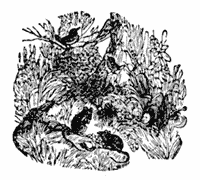
THE FOX AND THE CROW.
Crows feed upon worms: yet an author affirms
Cheshire cheese they will get if they're able;
"For," said he, "I well know, one unprincipled crow
Once purloined a large piece from my table."
Then away darted she, to the shade of a tree,
To deposit the booty within her;
[76]But it never occurr'd to the mind of the bird,
That a fox was to have it for dinner.
"How many a slip, 'twixt the cup and the lip!"
(Excuse me, I pray, the digression,)
Said a fox to himself, "I can share in the pelf,
If I act with my usual discretion."
So said he, "Is it you? pray, ma'am, how do you do,
I have long wish'd to pay you a visit;
For a twelvemonth has pass'd, since I heard of you last
Which is not very neighborly, is it?
"But, dear madam," said he, "you are dining, I see;
On that subject I'd ask your advice;
Pray, ma'am, now can you tell, where provisions they sell,
That are not an extravagant price?
[77]"Bread and meat are so dear, and have been for a year,
That poor people can scarcely endure it,
And then cheese is so high, that such beggars as I,
Till it falls, cannot hope to procure it."
But the ill-behaved bird did not utter a word,
Still intent on retaining her plunder;
Thought the fox, "It should seem, this is not a good scheme,
What else can I think of, I wonder?"
So said Reynard once more, "I ne'er knew it before,
But your feathers are whiter than snow is!"
But thought he, when he'd said it, "she'll ne'er give it credit,
For what bird is so black as a crow is."
[78]"But I'm told that your voice is a horrible noise,
Which they say of all sounds is the oddest;
But then this is absurd, for it never is heard,
Since you are so excessively modest."
If that's all thought the crow, "I will soon let you know
That all doubt on that score may be ended;"
Then most laughingly piped, the poor silly biped,
When quickly her dinner descended!
MORAL.
If this biped had not been so vain and conceited,
She would not by the fox quite so soon have been cheated;
But perhaps the term biped to some may be new:
'Tis a two-legged creature—perchance it is you.
THE LION AND THE ECHO.
A lion, bravest of the wood,
Whose title undisputed stood,
As o'er the wide domains he prowl'd,
And in pursuit of booty growl'd,
An Echo from a distant cave
Regrowl'd, articulately grave:
His majesty, surprised, began
To think at first it was a man;
[80]But on reflection sage, he found
It was too like a lion's sound.
"Whose voice is that which growls at mine?"
His highness ask'd. Says Echo, "Mine!"
"Thine!" says the Lion: "Who art thou?"
Echo as stern cried, "Who art thou?"
"Know I'm a lion, hear and tremble!"
Replied the king. Cried Echo, "Tremble!"
"Come forth," says Lion; "show thyself."
Laconic Echo answered, "Elf."
"Elf, durst thou call me, vile pretender?"
Echo as loud replies, "Pretender!"
At this, as jealous of his reign,
He growl'd in rage; she growl'd again.
Incensed the more, he chafed and foam'd,
And round the spacious forest roam'd
To find the rival of his throne,
Who durst with him dispute the crown.
A fox, who listen'd all the while,
Address'd the monarch with a smile:
[81]"My liege, most humbly I make bold,
Though truth may not be always told,
That this same phantom which you hear,
That so alarms your royal ear,
Is not a rival of your throne:
The voice and fears are all your own."
Imaginary terrors scare
A timorous soul with real fear;
Nay, even the wise and brave are cow'd
By apprehensions from the crowd:
A frog a lion may disharm,
And yet how causeless the alarm!
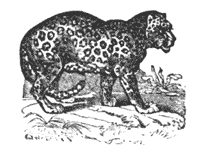
THE PAPER KITE.
Once on a time, a paper kite
Was mounted to a wondrous height;
Where, giddy with its elevation,
It thus express'd self-admiration:
"See how yon crowds of gazing people
Admire my flight above the steeple;
[83]How would they wonder, if they knew
All that a kite, like me, could do?
Were I but free, I'd take a flight,
And pierce the clouds beyond their sight.
But, ah! like a poor prisoner bound,
My string confines me near the ground.
I'd brave the eagle's towering wing,
Might I but fly without a string."
It tugg'd and pull'd, while thus it spoke,
To break the string—at last it broke!
Deprived at once of all its stay,
In vain it tried to soar away:
Unable its own weight to bear,
It flutter'd downward through the air;
Unable its own course to guide,
The winds soon plunged it in the tide.
Oh! foolish kite, thou hadst no wing,
How could'st thou fly without a string?
My heart replied, "Oh, Lord, I see
How much the kite resembles me!
Forgetful that by thee I stand,
Impatient of thy ruling hand;
[84]How oft I've wish'd to break the lines
Thy wisdom for my lot assigns!
How oft indulged a vain desire
For something more or something higher!
And but for grace and love divine,
A fall thus dreadful had been mine."
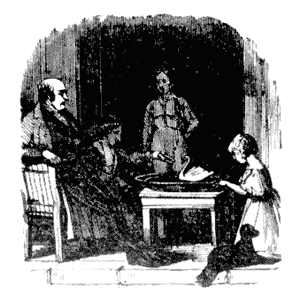
THE RATS AND THE CHEESE.
If bees a government maintain,
Why may not rats of stronger brain
And greater power, as well bethought
By Machiavelian axioms taught?
And so they are, for thus of late
It happened in the rats' free state.
Their prince (his subjects more to please)
Had got a mighty Cheshire cheese,
[86]In which his ministers of state
Might live in plenty and grow great.
A powerful party straight combined,
And their united forces join'd,
To bring their measures into play,
For none so loyal were as they;
And none such patriots, to support
As well the country as the court.
No sooner were those Dons admitted
But (all those wondrous virtues quitted)
They all the speediest means devise
To raise themselves and families.
Another party well observing
These pamper'd were, while they were starving,
Their ministry brought in disgrace,
Expelled them and supplied their place;
These on just principles were known
The true supporters of the throne,
And for the subjects liberty
They'd (marry would they) freely die;
But being well fix'd in their station,
Regardless of their prince and nation,
[87]Just like the others, all their skill
Was how they might their paunches fill.
On this a rat, not quite so blind
In state intrigues as human kind,
But of more honor, thus replied:
"Confound ye all on either side;
All your contentions are but these,
Whose arts shall best secure the cheese."
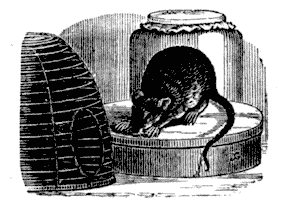
AURELIA AND THE SPIDER.
The muslin torn, from tears of grief
In vain Aurelia sought relief;
In sighs and plaints she pass'd the day;
The tatter'd frock neglected lay:
While busied at the weaving trade,
A spider heard the sighing maid
And kindly stopping in a trice,
Thus offer'd (gratis) her advice:
"Turn, little girl! behold in me
A stimulus to industry
[89]Compare your woes, my dear, with mine,
Then tell me who should most repine:
This morning, ere you left your room,
The chambermaid's remorseless broom
In one sad moment that destroy'd,
To build which thousands were employ'd!
The shock was great; but as my life
I saved in the relentless strife,
I knew lamenting was in vain,
So patient went to work again.
By constant work, a day or more,
My little mansion did restore:
And if each tear which you have shed
Had been a needle-full of thread,
If every sigh of sad despair
Had been a stitch of proper care,
Closed would have been the luckless rent,
Nor thus the day have been misspent."
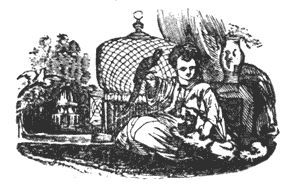
THE REDBREAST AND THE SPARROW.
Perch'd on a tree, hard by a rural cot,
A redbreast singing cheer'd the humble spot;
A sparrow on the thatch in critic spleen
Thus took occasion to reprove the strain:
"Dost thou," cried he, "thou dull dejected thing,
Presume to emulate the birds of spring?
[91]Can thy weak warbling dare approach the thrush
Or blackbird's accents in the hawthorn bush?
Or with the lark dost thou poor mimic, vie,
Or nightingale's unequal'd melody?
These other birds possessing twice thy fire
Have been content in silence to admire."
"With candor judge," the minstrel bird replied,
"Nor deem my efforts arrogance or pride;
Think not ambition makes me act this part,
I only sing because I love the art:
I envy not, indeed, but much revere
Those birds whose fame the test of skill will bear;
I feel no hope arising to surpass,
Nor with their charming songs my own to class;
Far other aims incite my humble strain.
Then surely I your pardon may obtain,
While I attempt the rural vale to move
By imitating of the lays I love."
THE POET AND THE COBWEBS.
A bard, whose pen had brought him more
Of fame than of the precious ore,
In Grub Street garret oft reposed
With eyes contemplative half-closed.
Cobwebs around in antique glory,
Chief of his household inventory,
Suggested to his roving brains
Amazing multitude of scenes.
[93]"This batch," said he, "of murder-spinners
Who toil their brains out for their dinners,
Though base, too long unsung has lain
By kindred brethren of Duck Lane,
Unknowing that its little plan
Holds all the cyclopedia of man.
"This one, whose radiant thread
Is every where from centre spread,
Like orbs in planetary skies,
Enclosed with rounds of various size,
This curious frame I aptly call
A cobweb mathematical.
"In secret holes, that dirty line,
Where never sun presumes to shine,
With straws, and filth, and time beset,
Where all is fish that comes to net,
That musty film, the Muse supposes
Figures the web of Virtuosos.
"You, where the gaudy insect sings,
Are cobwebs of the court of kings,
[94]Where gilded threads conceal the gin.
And broider'd knaves are caught therein.
"That holly, fix'd 'mid mildew'd panes,
Of cheerless Christmas the remains
(I only dream and sing its cheer,
My Muse keeps Lent throughout the year)
That holly, labor'd o'er and o'er,
Is cobwebs of the lawyer's lore,
Where frisky flies, on gambols borne,
Find out the snare, when lost, undone.
"These dangling webs, with dirt and age,
Display their tatter'd equipage,
So like the antiquarian crew,
That those in every thread I view.
"Here death disseminated lies,
In shrunk anatomies of flies;
And amputated limbs declare
What vermin lie in ambush there:
A baited lure with drugg'd perdition,
A cobweb, not misnamed physician.
"Those plaited webs, long pendent there,
Of sable bards a subtle snare,
[95]Of all-collective disposition,
Which holds like gout of inquisition,
May well denominated be,
The trap-webs of divinity."
But whilst our bard described the scene,
A bee stole through a broken pane;
Fraught with the sweets of every flower,
In taking his adventurous tour,
Is there entrapp'd. Exert thy sting,
Bold bee, and liberate thy wing!
The poet kindly dropp'd his pen,
And freed the captive from its den;
Then musing o'er his empty table,
Forgot the moral of his fable.
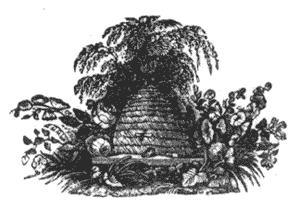
THE EPICURE AND THE PHYSICIAN.
Two hundred years ago, or more,
An heir possess'd a miser's store;
Rejoiced to find his father dead,
Till then on thrifty viands fed;
Unnumber'd dishes crown'd his board,
With each unwholesome trifle stored.
He ate—and long'd to eat again,
But sigh'd for appetite in vain:
His food, though dress'd a thousand ways,
Had lost its late accustom'd praise;
[97]He relish'd nothing—sickly grew—
Yet long'd to taste of something new.
It chanced in this disastrous case,
One morn betimes he join'd the chase:
Swift o'er the plain the hunters fly,
Each echoing out a joyous cry;
A forest next before them lay;
He, left behind, mistook his way,
And long alone bewildered rode,
He found a peasant's poor abode;
But fasting kept, from six to four,
Felt hunger, long unfelt before;
The friendly swain this want supplied,
And Joan some eggs and bacon fried.
Not dainty now, the squire in haste
Fell to, and praised their savory taste;
Nay, said his meal had such a gout
He ne'er in tarts and olios knew.
Rejoiced to think he'd found a dish,
That crown'd his long unanswer'd wish,
With gold his thankful host he paid,
Who guides him back from whence he stray'd;
[98]But ere they part, so well he dined,
His rustic host the squire enjoin'd
To send him home next day a stock
Of those same eggs and charming hock.
He hoped this dish of savory meat
Would prove that still 'twas bliss to eat;
But, ah! he found, like all the rest,
These eggs were tasteless things at best;
The bacon not a dog would touch,
So rank—he never tasted such!
He sent express to fetch the clown,
And thus address'd him with a frown:
"These eggs, this bacon, that you sent,
For Christian food were never meant;
As soon I'll think the moon's a cheese,
As those you dress'd the same with these.
Little I thought"—"Sir," says the peasant,
"I'm glad your worship is so pleasant:
You joke, I'm sure: for I can swear,
The same the fowls that laid them are!
And know as well that all the bacon
From one the self-same flitch was taken:
[99]The air, indeed, about our green
Is known to make the stomach keen."
"Is that the case?" the squire replied;
"That air shall be directly tried."
He gave command—a house he hired,
And down he goes with hope inspired,
And takes his cooks—a favorite train;
But still they ply their art in vain.
Perhaps 'twas riding did the feat:
He rides,—but still he cannot eat.
At last a friend, to physic bred,
Perceived his case, and thus he said:
"Be ruled by me, you soon shall eat,
With hearty gust, the plainest meat;
A pint of milk each rising morn,
Procure from cow of sable horn;
Shake in three drops of morning dew
From twig of ever-verdant yew;
It must by your own hand be done,
Your face turn'd westward from the sun.
With this, ere half an hour is past,
Well crumb'd with biscuit, break your fast;
[100]Which done, from food (or all is vain)
For twice three hours and one abstain—
Then dine on one substantial dish,
If plainly dress'd, of flesh or fish."
Grave look'd the doctor as he spake—
The squire concludes th' advice to take,
And, cheated into temperance, found
The bliss his former luxury drown'd.
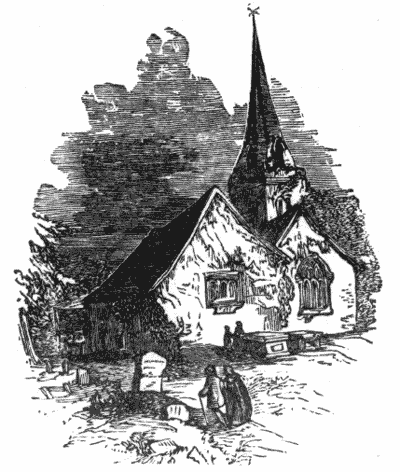
THE FROGS DESIRING A KING.
Athens in freedom flourish'd long,
'Till licence seized the giddy throng.
Just laws grown weary to obey,
They sunk to tyranny a prey.
Pisistratus, though mild he sway'd,
Their turbulence had not allay'd.
Whilst they were cursing in despair,
The yoke they had not learn'd to bear,
[102]Esop, their danger to describe,
Rehears'd this fable to the tribe:
"Some frogs, like you, of freedom tired,
From Jupiter a king desir'd:
One that should execute the law,
And keep the dissolute in awe.
Jove laugh'd, and threw them down a log,
That thundering fell and shook the bog.
Amongst the reeds the tremblers fled:
Till one more bold advanc'd his head,
And saw the monarch of the flood
Lying half smothered in the mud.
He calls the croaking race around:
"A wooden king!" the banks resound.
Fear once remov'd they swim about him,
And gibe and jeer and mock and flout him;
And messengers to Jove depute,
Effectively to grant their suit.
A hungry stork he sent them then,
Who soon had swallow'd half the fen.
Their woes scarce daring to reveal,
To Mercury by night they steal,
[103]And beg him to entreat of Jove
The direful tyrant to remove.
'No,' says the God, 'they chose their lot,
And must abide what they have got:'
So you, my friends, had best go home
In peace, lest something worse should come."
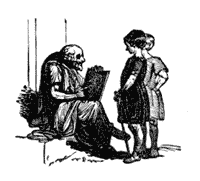
THE HARE AND THE BRAMBLE.
A hare, closely pursued, thought it prudent and meet
To a bramble for refuge awhile to retreat;
He enter'd the covert, but entering, found
That briers and thorns did on all sides abound;
And that, though he was safe, yet he never could stir,
But his sides they would wound, or would tear off his fur:
[105]He shrugg'd up his shoulders, but would not complain:
"To repine at small evils," quoth puss, "is in vain:
That no bliss can be perfect, I very well knew—
But from the same source good and evil doth flow—
And full sorely my skin though these briers may rend,
Yet they keep off the dogs, and my life will defend:
For the sake of the good, then, let evil be borne—
For each sweet has its bitter, each bramble its thorn."
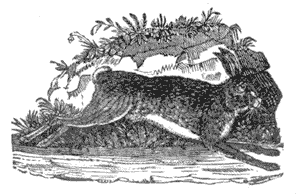
THE HORSE AND THE STAG.
Within a certain pasture,
There lived some creatures wild.
The sky was blue, the grass was green,
The air was very mild.
Now though this field was large and fine,
They could not live in love:
But for the grass in one large spot
A horse and stag once strove.
[107]The stag was strongest in the strife,
And so the battle won;
And from the field the horse was sent
And with chagrin was stung.
So to the man the horse applied,
For help, the stag to beat,
And so effectual was his help,
The stag had to retreat.
But when to go away he tried,
The man held to him fast:
"Now that you are of use," he cried,
"You'll serve me to the last."
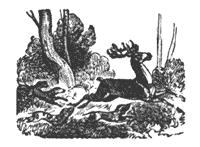
THE CAT AND THE OLD MOUSE.
The mice o'errun a certain house—
In every spot was found a mouse.
So for a cat the mistress went,
And to the kitchen puss was sent.
With diligence were many caught,
And eaten up. The mice were taught
That they some cunning must devise
To keep the prey from pussy's eyes.
[109]So on a certain shelf so high,
To reach which puss in vain might try,
There all the mice together got,
And they resolved to leave it not.
So pussy found that to eat them,
She must resort to stratagem.
And holding fast by means of pegs,
She hung suspended by the legs.
And downward she then hung her head,
And looked as though she were quite dead—
And thus she sought to cheat the mice,
And from their dwellings them entice.
A cunning mouse, well "up to trap,"
On pussy her two eyes did clap.
"Aha!" she cried, "puss are you there?
Within your reach, I would not dare—
Not e'en though it were proved by law,
That your whole skin were stuffed with straw."
THE FOX AND THE VIZOR MASK.
A fox while walking out one day,
Into a toy shop chanced to stray;
Among the toys that stood arrayed,
A vizor mask was there displayed,
With rosy cheeks, complexion fair,
And ruby lips and auburn hair,
And eyes of blue, and Grecian nose;
And many beauties to disclose,
It seemed made. The fox, with sighs,
Gazed on. "Ah, ah!" he cries,
[111]"Look at this head it naught contains,
It has rare beauty, but no brains."
MORAL.
The accomplished beau, in air and mien how blest.
His hat well fashioned, and his hair well dress'd—
But still undress'd within: to give him brains
Exceeds his hatter's or his barber's pains.
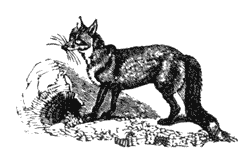
THE GOOSE THAT LAID GOLDEN EGGS.
A man once had a goose I'm told,
Which had laid each day an egg of gold.
Now if this treasure were well spent,
It might make any one content.
But no! this man desired more;
And though of eggs he had rich store;
He thought one day the goose he'd kill,
And then at once his pockets fill.
[113]So chasing goosey round and round,
She soon was caught and firmly bound
He opened her from neck to tail
And then his folly did bewail.
For not a single egg was there,
And thus he lost this treasure rare.
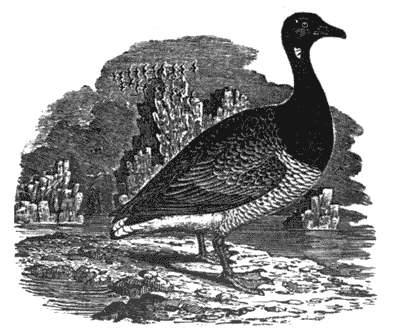
THE FOX AND THE GRAPES.
A fox once took it in his pate,
To go beyond a garden gate,
To see if there grew on the trees,
Some food his hunger to appease.
So in he went and there he spied
Some grapes. To reach them hard he tried.
Now they were large and luscious too,
Quite purple, and beautiful to view.
[115]So up he jumps with many a bound,
Until exhausted to the ground,
He falls. The grapes hang o'er his head,
In clusters large, "Well! well!" he said,
"You are but green, and hard as stone,
And all my time away is thrown.
I'll leave you to your solitude,
You are not fit to make me food."
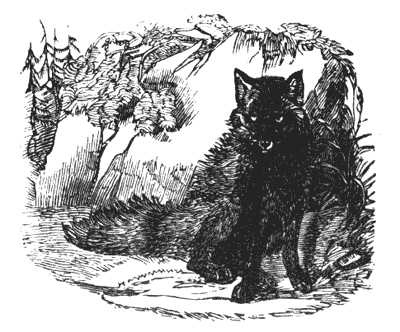
THE MOUSE AND THE WEASEL
A very thin and hungry mouse,
Into a granary stole,
Where stood a basket full of grain,
In which was a small hole.
After much squeezing he got in,
And there he ate his fill;
But when he tried to issue out,
The hole seemed smaller still.
[117]A weasel who stood looking on,
Cried out in sneering tone,
"You can't come out, my little dear,
Until you've smaller grown.
"You were half-starved when you crept in,
And now you are quite stout;
So cease to eat until you can,
As you got in, get out."
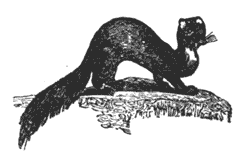
THE MISER AND HIS TREASURE.
In a retired spot,
A miser had got
A very large treasure in store.
And it was his delight,
Each morn and each night,
To count it and add to it more.
He had made the hole deep,
And he thought none would peep,
[119]To find out his secret retreat.
But a servant so sly,
His master did spy,
And thought that his cunning he'd beat.
So one dark winter night,
He took out his light,
And to the field hastened away;
And he laughed in his sleeve,
To think how 'twould grieve
His master to miss it next day.
And indeed the distress
Of his lord you may guess,
For words can't describe it, I'm sure.
He tore out his hair,
Clasp'd his hands in despair
And cried he was ruined and poor.
A man passing by,
His grief chanced to spy;
And told him, "'tis useless to mourn.
You can look at the hole,
To solace your soul,
Although all the money is gone."
THE JACKDAW AND THE PEACOCKS.
Thus Esop has the folly shown,
To build on merits not your own.
A jackdaw, empty, pert and vain,
Who held his equals in disdain,
One day some beauteous feathers found,
Left by a peacock on the ground.
When in the gaudy plumage dress'd,
The shallow thing his fortune bless'd;
[121]With stately gesture strode along,
And boldly join'd the peacock throng;
Who, his impertinence to pay,
First stripp'd him, and then chas'd away.
The crest-fall'n coxcomb homeward sneaks,
And his forsaken comrades seeks;
Where'er he comes, with scorn they leave him,
And not a jackdaw will receive him.
Says one he had disdain'd, at last,
"Such as thou art, thou mightst have pass'd,
And hadst not now been cast behind,
The scorn and scandal of thy kind."
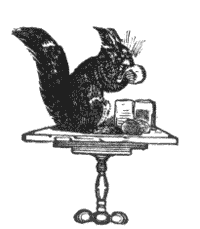
THE SPARROW AND THE HARE.
Who dares another's ills deride,
Had best against his own provide.
An eagle pouncing on a hare,
With piercing cries puss rends the air;
When a pert sparrow from a tree,
Insulted thus her misery:
"Ho, ho! poor puss, thy boasted speed
Has failed thee, then, in time of need!"
Scarce had she spoke, when, like an arrow,
A vulture darted on the sparrow.
Ere the poor hare resign'd her breath,
"This sight," she cried, "consoles in death
—That thou, who hast my woes derided,
My last of miseries hast divided!"
THE ASS AND THE LION.
Vain boasters credit may surprise,
Till known; who knows them will despise.
A lion once a hunting took
An ass, and hid him in a nook.
To drive the forest made him bray,
That he might seize the passing prey.
Long-ears set up such horrid cries,
That every creature trembling flies;
[124]The lion, practised in his trade,
Had soon abundant carnage made;
Satiate with spoil, the ass he calls,
And bid him cease his hideous brawls.
The king he found with slaughter weary,
Surrounded by his noble quarry,
And, puffed with self-importance, said:
"Sir, to some purpose I have bray'd!"
"No ass more famously could do,"
The lion says, "but thee I knew,
Or I might have been frightened too."
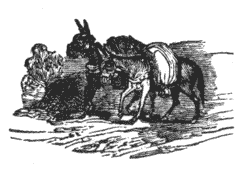
THE STAG AND THE FOUNTAIN.
That good from bad men rarely know,
This apologue may serve to show:
A stag upon a fountain's side,
Beheld his branching horns with pride;
While of his spindle-shanks asham'd,
Their disproportioned form he blam'd.
Sudden he hears the hunter's cries,
And to the forest nimbly flies.
[126]The woods receive their well-known guest.
His tangled horns, his feet arrest;
The hounds approach, and seize their prey;
Who, dying, thus was heard to say:
"Wretch that I am! too late I learn,
How little we the truth discern!
What would have saved me, I despis'd,
And what has been my ruin, priz'd!"
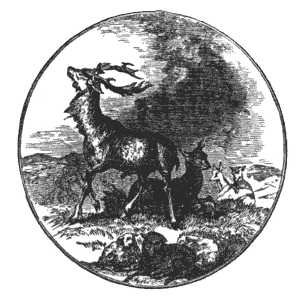
THE EAGLE, THE CAT, AND THE SOW.
Her nest on high an eagle made
Lower a cat her kittens laid;
And at the bottom of the tree
A sow dispos'd her progeny.
Vile puss to gain her wicked ends,
Much love for both of them pretends.
First to the eagle's aerie mounts,
And thus to her false alarms recounts:
"Madam, in truth our dangerous state,
'Tis with reluctance I relate;
But things are really gone so far,
Conceal them I no longer dare.
[128]Night after night the treacherous sow
Our tree has undermined below;
Ere long it cannot choose but fall,
And then she hopes to eat us all."
Successful when she saw her lies,
Down to the bristly sow she hies;
"My worthy neighbor!" crying out,
"I pray you, mind what you're about,
For to a certainty I know,
The eagle waits but till you go,
(The thing with great concern I say,)
To make your little ones her prey."
Suspicious dread when thus inspir'd,
Puss to her hole all day retir'd;
Stealing at night on silent paw,
To stuff her own and kittens' maw.
To stir nor sow nor eagle dare.
What more? fell hunger ends their care;
And long the mischief-making beast
With her base brood on carrion feast.
Learn hence, ye simples, ere too late,
What ills the double-tongued create.
THE EAGLE, THE RAVEN AND THE TORTOISE.
Who in their foe united find
Force, art, and a remorseless mind,
Whate'er their strength and prowess be,
To perish stand in jeopardy.
An eagle once a tortoise held,
Safe in his horny house concealed,
Which he in vain essayed to break
With all the fury of his beak.
As with his prey he wing'd the air,
A wily raven ventur'd near:
[130]"Your prize is excellent," says she,
"And if you'll give a share to me,
I know, for all his iron hide,
How we the dainty may divide."
The bargain made, "On yonder wall,
Down," says the raven, "let him fall."
He listen'd to the hoary sinner;
And they on turtle made their dinner.
Thus fraud and force their purpose gain,
And nature fortifies in vain.
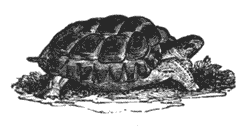
THE FLY AND THE HORSE.
A fly upon a coach-box seated,
With arrogance the horses rated.
"Advance!" cries out the paltry thing,
"Unless you mean to feel my sting."
"Not thee we heed," a horse replied,
"But him whose skilful hand can guide
The rein and whip. We better know
Than thee when we should stop or go."
Thus men without or sense or weight,
Think themselves born to rule the state.
ESOP AT PLAY.
When an Athenian Esop saw,
Playing with school-boys once at taw,
The man with laughter shook his sides;
Esop the laughter thus derides:
"Of this slack bow before you laid,
The meaning, sprightly sir," he said,
"Explain!" (A crowd had gather'd round.)
Surpris'd, the man no answer found:
He puzzled long, but all his wit
Could on no explanation hit.
[133]The laugh on Esop's side; says he,
"Why you this bow unbended see,
It is because it needs must break,
If always bent; so we must take
Due relaxation, that the mind
Its vigor may when wanted find."
He who in harmless sport employs
A vacant hour, is not unwise.
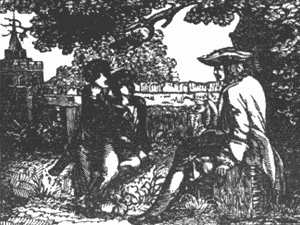
THE OLD PILOT AND THE SAILORS.
To one complaining of his fate,
Esop this fable did relate.
A ship by raging tempests toss'd,
The seamen, giving all for lost,
'Twas who should weep and pray the most.
Grown calm at once the sky and sea,
They shout in joyful extacy.
The pilot, from experience wise,
The giddy crew did thus advise:
"Nor much rejoice, nor over grieve,
But decently what comes receive;
Since good and ill succeed so near,
Meet ill with hope and good with fear."
THE CRAB AND HER DAUGHTER.
Not what they hear, but what they see,
Will children and domestics be.
A crab one day her daughter chid;
"You never do as you are bid,
Have I not told you o'er and o'er,
That awkward gait to use no more?
Learn, ninny, once for all to know,
Folks forward and not backward go."
[136]"Mamma," says Miss, "how strange you talk!
Have I not learn'd from you to walk?
Were I to move the other way,
How could I follow you I pray?"
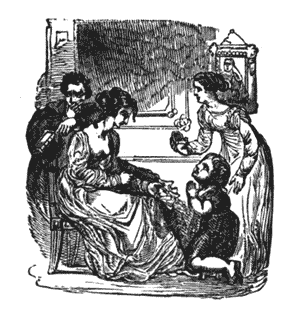
THE SUN AND THE WIND.
Phebus and Boreas from on high
Upon the road a traveller spy,
Wearing a cloak for fear of rain.
Says Boreas, "his precaution's vain
'Gainst me, I'll show you for a joke
How soon I'll make him quit his cloak."
"Come on," says Phebus, "let us see
Who best succeeds, or you or me."
The wind to blow so fierce began,
He almost had upset his man;
[138]But still his cloak, for all his roar,
Was wrapp'd more closely than before.
When Boreas what he could had done,
"Now for my trial," says the Sun,
And with his beams so warm'd the air,
The man his mantle could not bear,
But open'd first, then threw aside.
Learn hence, unbending sons of pride
Persuasive manners will prevail,
When menaces and bluster fail.
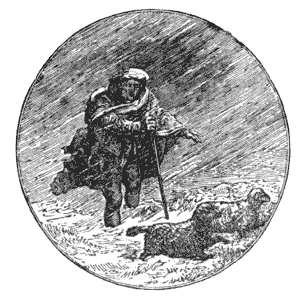
THE TWO POTS.
Forc'd on a stream to make their way,
To pot of brass says pot of clay:
"Since brass is stout and clay is frail,
Pray let us at a distance sail.
Not your intention that I fear
Sir Brass," adds humble Earthenware,
"While the winds leave you to yourself;
But woe betide my ribs of delf,
[140]If it should dash our sides together;
For mine would be the damage, whether
Their force should you or I impel;
To pray proceed, and fare you well."
Learn hence, ye folks of low estate,
To keep due distance from the great.
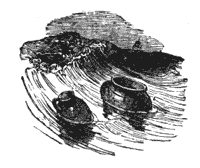
HERCULES AND THE CARTER.
His cart bemired, a carter pray'd
To Hercules to come and aid.
"Up!" says the God, "thou lazy dog.
And lift the axle from the bog;
Think'st thou Gods nothing have to do
But listen to such knaves as you?"
THE ANT AND THE GRASSHOPPER.
From a wise emmet, well sustain'd
On what her industry had gain'd,
A grasshopper some aid desir'd.
"What was his trade?" the ant inquir'd.
"I've none," the grasshopper replied;
"I range the country far and wide,
Singing all day from door to door,
And have no time to form a store."
Shutting her granaries, says the ant,
"No wonder, friend, you are in want;
[143]He who all summer sings, may chance
In winter to be forc'd to dance."
To spend his time in idle song,
The thoughtless grasshopper was wrong;
And not to give a small supply,
The emmet mean and niggardly.
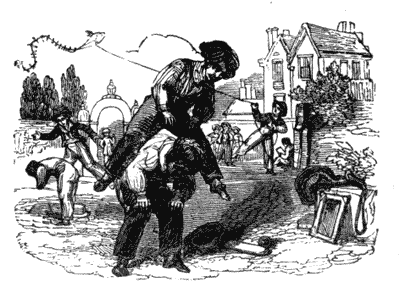
THE CROW AND THE PITCHER.
Patience and ingenuity
The want of natural means supply.
A thirsty crow some water found,
But in a vessel so profound,
That with her neck at utmost stretch,
A single drop she could not reach.
Then stones she in the pitcher places,
Which to the top the water raises;
And by this innocent device
Her thirst at leisure satisfies.
THE ANGLER AND THE LITTLE FISH.
An angler a small salmon caught,
Who with much earnestness besought
That he would let her go: says she,
"What can you do with such as me!
Next year when grown a little bigger,
I in your bag might make a figure."
The prudent man replied, "No, no;
Into my pouch, though small, you go.
A bird in hand is better far,
Than two that in the bushes are."
THE FROG AND THE FOX.
Let us our own defects amend,
Ere to guide others we pretend.
A sallow, wrinkl'd, spotted frog,
To turn physician left the bog.
"He every malady could cure,"
He said, "that animals endure."
"First on yourself your science show,"
Says Reynard: "that the world may know
Your skill and knowledge, pray begin
Of those foul spots to clear your skin:
For while you look so sick and pale,
To vend your drugs you'll ne'er prevail."
THE APE AND HER YOUNG ONES.
An ape had cubs; one much she lov'd,
The other small affection prov'd.
Alarm'd, she hears the hunter's cries;
And catching up her darling flies:
Through fear she stumbled o'er some stones
And broke the little favorite's bones;
[148]The other to her back who clung
Uninjured went with her along.
Mothers, beware! the fondl'd child
By too much tenderness is spoil'd;
While those who hardships have endur'd,
To suffer life are best inur'd.
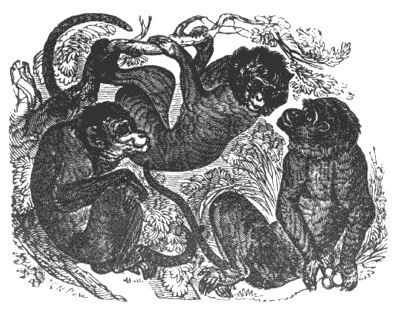
THE FIR TREE AND THE THORN.
The lowly and contented state
Is farthest from the wounds of fate.
A fir tree upon a humble thorn
From his high top look'd down with scorn.
"For loftiest fanes we grow," she said,
"Of us the tallest masts are made,
While thou, poor bramble, canst produce
Nothing of ornament or use."
[150]"Great tree," the modest thorn replied,
"When the sharp axe shall pierce your side,
In vain you then may wish to be
Unsought-for, and unknown like me."
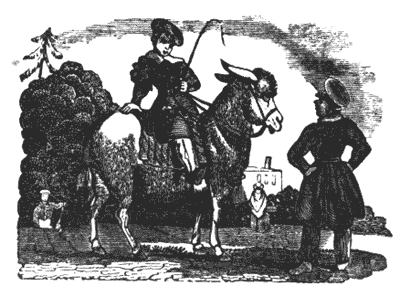
THE ASS IN THE LION'S SKIN.
Fools may on other fools impose;
The sage their real value knows.
An ass once found a lion's skin,
And rolling up himself therein,
From every fold that he came nigh,
Made flocks, and herds, and shepherds fly.
Ranging the country round, at last
He meets his master where he pass'd,
[152]Who long-ears instantly descries
Through his magnificent disguise:
Laying his cudgel on his side,
"Get home, thou stupid fool," he cried:
"With others for a lion pass;
I know thee for an arrant ass."
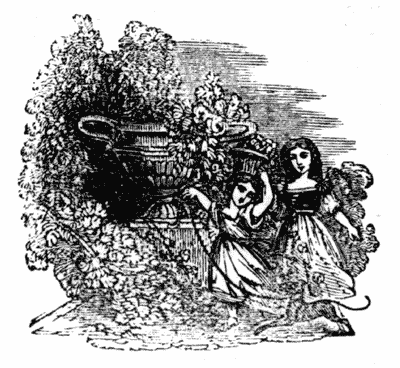
THE DOG IN THE MANGER.
A mastiff in a stable lay,
Couch'd on a manger full of hay.
When any thing drew near to eat,
He quickly forced it to retreat.
An ox then cried, "detested creature,
How vile is thy malignant nature,
Which will not others let enjoy
That which thou never canst employ!"
THE STAG AND THE VINE.
A stag pursued with horn and hound
In a thick vineyard shelter found.
Soon as he thought the danger past,
He on the vine began to feast.
The huntsman hears the rustling noise,
And through half-eaten leaves descries
His branching horns, the pack recalls,
And merited the creature falls
To his ingratitude a prey.
Those their protectors who betray,
Unpitying, all the world will see
Consign'd to death and infamy.
THE MISCHIEVOUS DOG.
Titles and ribands, bought with shame,
Folly and vice but more proclaim.
A man who own'd a vicious dog,
Upon his collar fix'd a log,
Which the vain cur supposed to be
A note of worth and dignity.
A mastiff saw his foolish pride;
"Puppy," indignantly he cried,
"That thing is put about your neck
Your mischievous designs to check;
And to who see you to declare,
Of what a currish race you are."
THE SICK MAN AND THE PHYSICIAN.
Woe to the land where those who guide,
To please the people's foolish pride,
Persuade them there is nought to dread,
When ruin threatens o'er their head.
A patient, ask'd to tell his pains,
Of thirst and shivering cold complains.
"'Tis very good," the doctor said;
"He has but to remain in bed,
And take the med'cines I shall send,
The thing will soon be at an end."
[157]When next the question was repeated,
The man complain'd he much was heated;
"This," cried the leech, "is better still!"
And thus to each increasing ill,
"That it was going well," he cried,
Till the poor martyr sunk and died.
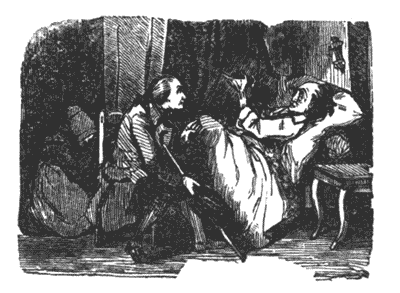
THE FARMER AND HIS SONS.
Work, work, my boys, with hand and mind!
Your labors you will fruitful find.
A husbandman, about to die,
Call'd on his children to come nigh:
"I leave," he says, "a small estate,
But wherewithal to make it great:
For know, a treasure it contains,
If you to search will take the pains."
[159]He died. The sons dug all the ground,
And there no hidden treasure found;
But so productive was the soil,
The crop by far o'erpaid the toil.
Says one, when they the corn had sold,
"This treasure 'twas our sire foretold!"
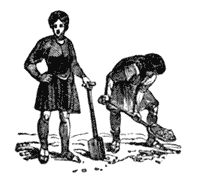
THE SWALLOW AND THE BIRDS.
Those who of guides stand most in need,
Are least inclin'd advice to heed.
A travell'd swallow, learn'd and wise,
To all his feather'd neighbors cries:
"See you yon laborers there below;
What is it, think ye, that they sow?
'Tis hemp, my friends; of which are made
The nets that for us all are laid;
The moment yonder men are gone,
Then pick the seeds up one by one."
[161]The gay inhabitants of air
For his precaution little care.
The seedling sprung; again the swallow
Urges his good advice to follow;
Again his counsel they deride.
The plants full grown, and cut, and dried,
Beaten and spun, the nets were made,
And the unwary birds betray'd,
Regretting, in their hapless fate,
Their incredulity too late.
Learn hence the danger to foresee,
Nor wait for their maturity.
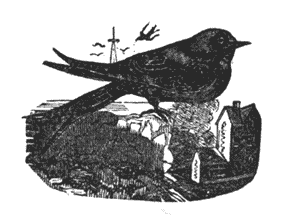
THE BOASTING TRAVELLER.
A fellow who abroad had been,
Told marvels he had done and seen:
"When resident at Rhodes," he said,
"A leap of twenty yards he made
Over a barrier ten feet high;
A dozen witnesses were by."
"Come on," says one, at the same table,
"Yon ditch and fence to o'erleap you're able.
[163]They're not, by much, so high or wide;
Here let the experiment be tried.
Suppose yourself at Rhodes, and we
Your faithful witnesses will be."
The man replied, "that he to-day
Was not quite well," and stole away.
Who boast of what they cannot do
Both knavery and folly show.
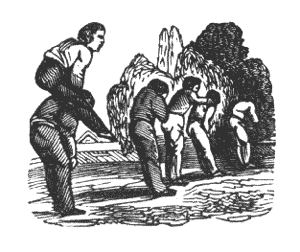
THE OLD WOMAN AND HER MAIDS.
Better known evils to endure,
Than seek by wrong a doubtful cure.
A thrifty dame her maids awoke
At the first crowing of the cock.
They of such early rising tir'd,
To kill the harmless cock conspir'd.
The dame, to hear him crow in wait,
Next morning lay in bed till eight.
[165]But when she knew the trick they had play'd,
She caused a larum to be made,
And rung it daily in their ears
Two hours before the dawn appears.
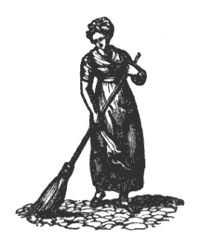
INDUSTRY AND SLOTH.
Insidious sloth her object gains,
If but a hearing she obtains.
A youth ask'd why so long in bed?
"I listen to a cause," he said;
"As soon as I unclose my eyes.
First industry excites to rise."
"Up, up," she says, "to meet the sun,
Your task of yesterday's undone!"
[167]"Lie still," cries sloth, "it is not warm,
An hour's more sleep can do no harm;
You will have time your work to do,
And leisure for amusement too."
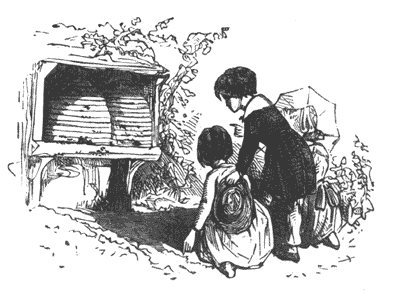
THE SHEPHERD TURNED MERCHANT.
Fair weather sailors, keep at home,
For be assur'd the storm will come.
A shepherd of an inland breed
Brought to the coast his flocks to feed;
The beauty of a summer sea,
A merchant tempted him to be.
He sold his sheep, and with the sale
Purchas'd of dates an ample bale.
He sail'd; a furious tempest rose;
Into the sea his dates he throws;
[169]And swimming from the bark to land,
Arrives half dead upon the strand.
To one, soon afterwards who stood
Pleas'd with the calmness of the flood,
"Aye, aye," the simple shepherd said
"With dates again it would be fed."
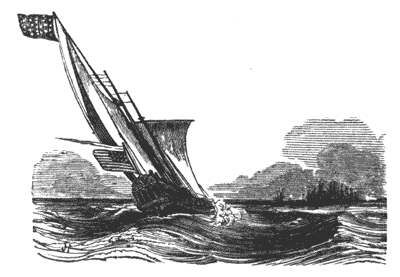
THE SPENDTHRIFT AND THE SWALLOW.
A fool who all had thrown away,
When wandering pennyless one day,
Perceived a swallow. "Ho," says he,
"Summer is come at last I see!"
And to a Jew his mantle sold.
Next day it was severely cold:
Starv'd as he walk'd, the bird he found
Frozen to death upon the ground.
"Ah! what a fool was I," he cried,
"When on one swallow I relied!"
Those who too readily believe,
For their credulity may grieve.
THE EAGLE AND THE CROW.
The wise well know their force to weigh,
Nor what they cannot do, essay.
A carrion crow an eagle saw
Seize on a lamb with beak and claw.
Conceiving he could better do,
He pounces on a well fed ewe;
[172]But he and not the sheep was caught;
For when to fly with it he sought,
His feet entangled in the wool,
The shepherd seiz'd the helpless fool.
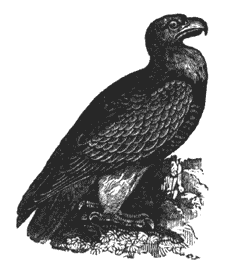
THE WOLF AND THE SHEPHERD'S BOY.
In wantonness a shepherd's boy
Alarm'd the neighbor's with his cry;
"The wolf! the wolf!" And when they came,
Of their lost labor made his game.
At last the wolf when there indeed,
His real cries they did not heed;
[174]He and his flock a prey were made,
And for his lies he dearly paid.
Those who are known to have deceiv'd,
When they speak truth, are not believ'd.
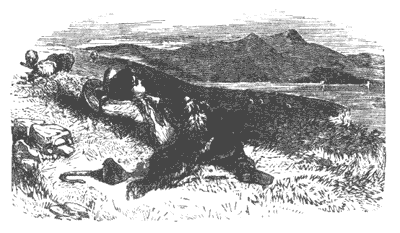
THE FOX WITHOUT A TAIL.
Fashions and modes we often see,
Made to conceal deformity:
Those to whom nature has been kind,
Should leave such fopperies behind.
A fox who in a trap was taken,
Resign'd his brush to save his bacon.
[176]Ashamed that all the world should know
His cunning had been cheated so,
To an assembly of the nation
He made the following oration:
"I oft have thought the tails we wear
A troublesome appendage are;
Where's their utility, I pray?
They serve but to obstruct our way.
Nor ornamental do I find,
To drag this ponderous length behind.
For my part, without more debate,
I move our tails we amputate."
"Please, sir, to show yourself behind,"
(Says one to smoke the jest inclin'd,
And who discovered what it was)
"We there perhaps shall see the cause,
Ere we your prudent counsel take,
Why you this curious motion make?"
His bare posteriors when they found,
Loud laughter shook the benches round;
Nor could the fox without a tail
To introduce the mode prevail.
THE MEN AND THE OYSTER.
Any partition better make,
Than all the hungry law should take.
By the sea side two travellers found
A fine large oyster on the ground;
His claim each obstinately lays:
"I saw it first," one eager says;
"I pick'd it up," the other cries;
"Mine"—"Mine is certainly the prize."
[178]They talk'd as usual, loud and long;
And more they reason'd, more were wrong;
Till they a neighboring lawyer see
Passing, and mutually agree
To take him for their referee.
With legal dignity of face,
He heard them both relate the case;
"Your claims are good," then gravely said,
"And a brave lawsuit would have made
Which to prefer I cannot tell,
So each of you must take a shell;
And, as the oyster is but one,
That I myself will swallow down;
To stink it otherwise had lain,
And all your cash been spent in vain;
You're cheaply off; go home content;
And faith the fish was excellent."
THE SHEPHERD AND HIS DOG.
A dog his master so deceiv'd,
He was the best of curs believ'd.
The flock was trusted to his care,
Whene'er the shepherd was not there.
And in the house, a favored guest,
He always fed upon the best.
The treacherous guard his charge betray'd
And on the sheep in secret prey'd.
The master, when the crime was prov'd,
With double indignation mov'd,
[180]About his neck the halter tied
Himself: the dog for mercy cried;
"You let the wolf escape," he said,
"Who much more slaughter oft has made."
"Wretch!" says the man, "the wolf declares
Hostility, and boldly dares;
He has no confidence abused:
But, coward, thou my trust hast used:
Against myself! and on this tree
Without delay shalt hanged be."
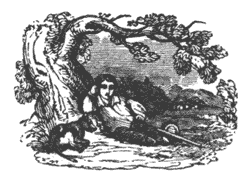
THE COUNTRYMAN AND THE JUSTICE.
The law still lends the readiest aid,
When well her ministers are paid.
A countryman, by power oppress'd,
Seeking to have his wrongs redress'd,
Oft to the justice went in vain;
Admittance he could ne'er obtain,
But still was bid again to come;
"Unwell"—"engag'd"—or "not home!"
[182]The wily rustic took a kid
One day, and in a basket hid;
And when he to the house drew near,
Began to pinch him by the ear,
So that the porter, from the hall,
Might hear the little fatling squall;
The man his master's mind who knew,
Open'd the door and let him through.
The shepherd, laughing as he pass'd,
Says to his kid, "Thy cries at last
An audience for my wrongs obtain;
Thy flesh, perhaps, redress will gain."
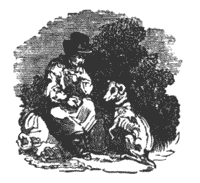
THE COCK AND THE FOX.
The world applauds the lucky hit,
When it beholds the biter bit.
A treach'rous fox invited down
A cock, who on a tree had flown.
"Do you not know, my friend," says he,
"Bird, beast, fish, reptile, man agree,
To live henceforth in amity?[184]
Come down and celebrate the day."
"Troth," quoth the cock, "you truly say;
For hounds I see come o'er the dell,
With open mouths, the news to tell."
"Adieu," says Ren. "'Tis best to go;
Those dogs the treaty may not know."
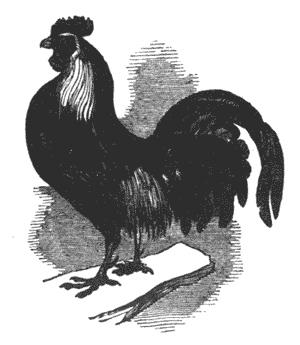
THE BLIND MAN AND THE LAME.
Who kind assistance give and take,
Life's arduous journey best will make.
Two men, one blind, the other lame,
To pass a ford together came.
The stream was rapid, and the way
Obliquely thwart the current lay;
To his companion says the blind,
"Yon winding road I ne'er shall find."[186]
"Nor my poor limbs," the lame replied,
"The current's rapid force abide."
"Come," says the blind, "my loins are strong,
I'll bear you on my back along,
While you to guide me give the word;"
And thus they safely cross'd the ford.
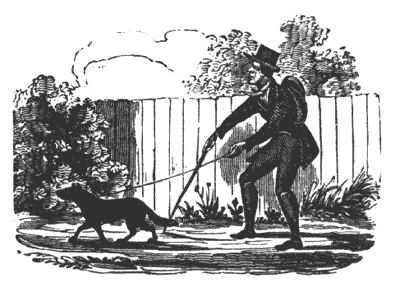
THE MAN AND THE SERPENT.
There's in the world a cursed race,
Of nature so perverse and base,
If from the gallows you should save,
A dangerous enemy you have.
A countryman a serpent found,
Stiffen'd with frost upon the ground,
And took her home; but when the fire
Began new vigor to inspire,
[188]Swelling her neck with angry eyes,
She fills the cot with hissing cries.
The rustic then his axe did take,
"Is this then the return you make?
Is this your gratitude?" he said,
And knock'd the reptile on the head.
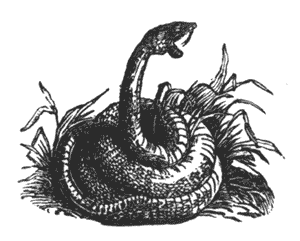
THE TWO STREAMS.
Those who display much dash and din,
Have seldom any thing within.
A weary traveller, one day,
Cross'd o'er a river in his way;
Alarm'd to see the foaming tide
Dashing o'er rocks from side to side,
Nevertheless, his course to keep,
He ventur'd in with trembling step;
And found the water neither deep,
[190]Nor footing bad; and got well o'er.
When he had travell'd some leagues more,
He to another river came,
That smoothly flowed, a silent stream:
This he thought easily to pass;
But ere he in the middle was,
He plunged into a gulf profound,
And for his feet no bottom found;
But, forced to swim with all his might,
Got to the shore in piteous plight.
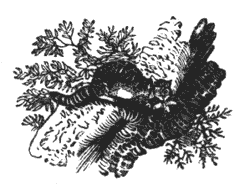
THE SOT AND HIS WIFE.
Inveterate sin is seldom cur'd.
A wife had long a sot endur'd,
Who all his time in taverns spent,
While his affairs in ruin went.
Once as insensible he lay,
She dress'd him in a corpse's array,
And with the undertaker's aid,
Into a burying vault convey'd.
The fumes dispersed, the man awakes;
All for reality he takes.
[192]When by the glimmering of a lamp
He saw his mansion drear and damp,
Reflecting how his life had pass'd,
A forced repentance came at last.
The wife, with suited voice and dress,
Presented an infernal mess:
"Good Trap, pray take away your meat;
I have no appetite to eat,"
He cried, "but faith I'm devilish dry:
Can't you a bowl of wine supply?"
The woman, seeing all was vain,
Restor'd him to his casks again:
Consol'd with certainty, that he
Ere long a real corpse must be.
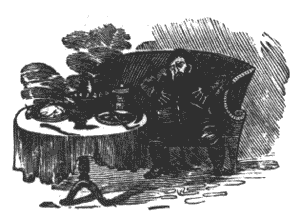
THE FARMER AND HIS QUARRELSOME SONS.
Three sons an honest farmer had;
And it so happen'd, ne'er a lad
Could with the other two agree;
All quarrelling perpetually.
Their time in idle contest spent,
Garden and farm to ruin went;
And the good farmer and his wife
[194]Led but a miserable life.
One day as this unhappy sire
Sat musing by his evening fire,
He saw some twigs in bundles stand,
Tied for the basket-maker's hand.
Taking up one: "My boys," says he,
"Which is the strongest, let me see;
He who this bundle breaks in twain,
The preference, and this prize shall gain,"
(Showing a pair of Sunday shoes.)
The rivals every effort use
In vain. Their utmost force when tried,
The father took the twigs untied,
And giving to them one by one,
The work immediately was done.
"Yon twigs," he says, "that broken lie,
This useful lesson may supply:
That those in amity who live,
And succor to each other give,
Double their forces to resist
Oppression, and their work assist."
THE FIG TREE AND THE FLOWERING SHRUB.
Flowers which many leaves display,
In fruitless beauty fade away.
Cries one of these, with saucy sneer,
To a plain fig-tree growing near,
"How comes it, honest friend, that thou
Dost in the spring no blossoms show?"
Says he, "I keep them out of view,
For fear I should resemble you,
[196]And in the autumn nought produce
Of permanence and solid use."
Who soon and much essay to shine,
May dread a premature decline.
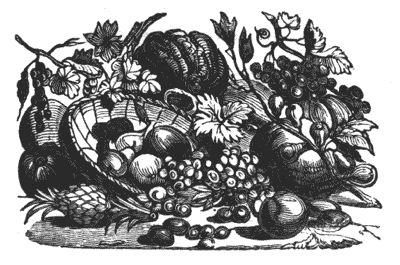
THE FARMER AND THE LANDLORD.
A farmer of an honest fame,
One morning to his landlord came:
"Alas, my lord," he weeping said,
"Gored by my bull, your ox is dead.
What must be done?" "The case is plain,"
Replies the lord; "the creature slain,
[198]The owner of the bull must pay;
Let it be done without delay."
"Heav'n give your worship long to live!
I hope you will a good one give,
For mine was good!" "How! your's, my friend?
Let me your story comprehend:
Your bull, you say, my ox has gored?"
"Forgive me the mistake, my lord,
In my confusion I have made;
Mine was the ox that must be paid;
But 'tis all one—what's just for me
The same must for your worship be:
I'll tell the steward what you say."
"Not yet—we'll think of it to-day.
Further inquiry must be had;
Perhaps your fences were but bad;
Perhaps—but come again to-morrow."
The honest laborer saw with sorrow,
That justice wears a different face,
When for themselves men put the case.
THE SCHOOL-BOY AND THE MONITOR.
At play on Thames's verdant side
A school boy fell into the tide,
Where providentially there stood
A willow, bending o'er the flood.
Buoy'd on its branch, he floating lay,
The monitor pass'd by that way.
The lad entreats his life to save:
The Don replies with aspect grave,
[200]"Sirrah, what business had you there?
How vain is all our watchful care!
You never heed a word we say;
Your disobedience you shall pay!"
"First," says the boy, "pray stretch your hand:
I'll hear you when I come to land."
This is for those, with vain parade
Who give advice, instead of aid.
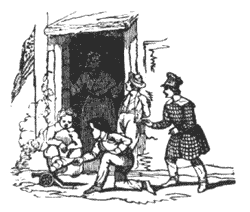
THE MILLER AND HIS ASS.
A rustic bringing to the fair
An ass, that he might show him there,
Sleek and well looking let him trot;
He followed with his son on foot.
The first they met upon the road,
At our pedestrians laugh'd loud,
[202]"Look at those two legged asses," cried,
"Who trudge on foot when they might ride!"
The father with the hint complies:
Makes the boy mount. Now other cries
Assail their ears; by graybeards blam'd;
"Sirrah, you ought to be asham'd
To ride and let your father walk!"
Again he listened to their talk.
The sire got up, the youth got down;
When passing through a country town,
At every door the mothers said,
"A murrain light on thy old head!
Hast thou no bowels for thy kind?
At least take up the lad behind."
This done they next were thus address'd:
"Two lubbers on a little beast?
They fitter are to carry him!"
Complying with this senseless whim,
Upon a pole his feet in air,
The ass they on their shoulders bear.
[203]Now laughing shouts spread far and wide.
The ass's ligatures untied,
"Proceed, my son," then said the man:
"To please the world, do all we can,
Since 'tis impossible, you see,
To please ourselves content we'll be."
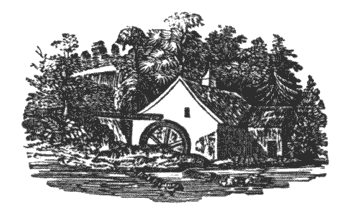
THE DREAMER AND HIS SON.
Mortals bring down upon their head
The very miseries most they dread.
The only son of a rich knight
In hunting daily took delight.
The father living in alarm,
Lest he should come to any harm,
Dream'd that he saw him on the ground,
Rent with the lion's fatal wound.
[205]The youth, allow'd to hunt no more,
Impatiently confinement bore.
Remarking, one unlucky day,
In the fine chamber where he lay,
A lion painted on the wall,
"Thou art," he cried, "the cause of all."
With idle rage the wall he struck,
And in his hand an iron stuck,
Which piercing bones and sinews through,
Fester'd and then a gangrene grew.
And thus the father's ill-tim'd care
Deprived him of his son and heir.
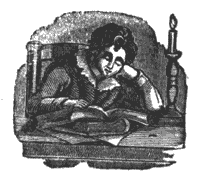
THE OLD MAN AND DEATH.
Though life be welcome to the wise,
Death cannot take him by surprise;
Aware that every day and hour
He holds but at the tyrant's power,
That beauty, talents, worth, are vain.
A moment's respite to obtain.
Nothing more known, and yet how rare
It is with courage to prepare
[207]For this inevitable day!
All hope a little more delay.
One who had suffer'd many a year,
And to a century drew near,
At last complain'd, that unawares
Death came, unsettled his affairs:
"My will is not completely made;
A little time," he trembling said,
"A little longer let me live;
Some warning 'tis but fair to give!
My grandson is expected home;
At least pray, let the doctor come."
"Poor helpless driveller!" Death replied,
"Ten years ago thou should'st have died!
Thy friends, thy foes, thyself outliv'd:
Almost an age thou hast surviv'd:
Some who their day had scarce begun.
Others beneath their noon-tide sun—
Time's deepest lines engrave thy brow,
And dost thou hesitate to go?
Idiot, what warning would'st thou have?
One foot already in the grave:
[208]Sight, hearing, feeling, day by day,
Sunk gradual in a long decay.
I blame myself for my neglect;
Thou'st not a moment to expect!"
When failing nature warns, the sage
Sees death a refuge from old age;
And rising from life's lengthened feast,
Willing retires, a sated guest.
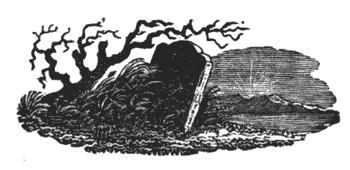
THE PAINTER.
When candid critics deign to blame
Their index points the road to fame,
But when dull fools your works admire,
Throw them at once into the fire.
In Rome there dwelt, in days of yore,
A painter deep in graphic lore.
His touch was firm, his outline true,
And every rule full well he knew.
[210]A Mars he painted, meant to show
How far his learned skill could go.
The work complete, he call'd a friend,
On whose good taste he could depend.
The friend was honest, spoke his thought,
And fairly pointed out the fault,
"That overwork'd in every part,
It show'd too much laborious art."
The painter argued for his rules,
And cited maxims from the schools;
Still the judicious critic held
The labor should be more conceal'd.
While they disputed on his stricture,
A coxcomb came to see the picture:
Entering, he cries, "Good heavens, how fine!
The piece, I swear, is quite divine!
The sword, the knot, the belt, the leather,
The steel, the gold, the silk, the feather,
Are perfect nature, all together!"
The painter, reddening with despite,
Whispers, "My friend, by Jove, you're right.
[211]'Tis not enough our art to know,
Till less of it we learn to show;
My picture must be done again
I see, to please discerning men."
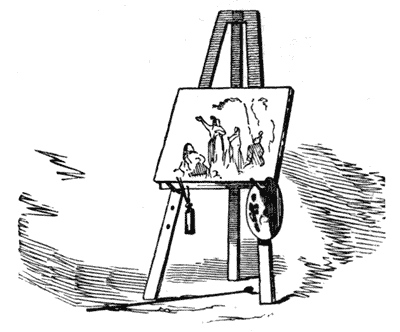
THE COBBLER AND THE NABOB.
A cobbler, who had fix'd his stall
Against a nabob's palace wall,
Work'd merrily as others play,
And sung and whistled all the day.
A prey to many an anxious care,
Less merry was the lord, by far;
And often in the night he thought
It hard, sleep was not to be bought:
[213]And if tow'rds morn he got a doze,
The cobbler troubled his repose.
One day he bid the man attend—
And, "Well," says he, "my honest friend,
How is it that so well you thrive?
You seem the happiest man alive.
Pray, what may be the profit clear,
That you can earn within the year?"
"What in a twelvemonth I can earn,
My lord, was never my concern;
'Tis quite enough," the cobbler said,
"If I can gain my daily bread."
"Take then this note"—'twas twenty pound;
"But sing not with so shrill a sound,
Good man," the generous nabob cries,
"When early to your work you rise;
For then I want to close my eyes."
Delighted to his stall he went:
But now he first felt discontent;
All day he neither work'd nor ate,
For thinking of his happy fate.
[214]At night, when he retir'd to bed,
He plac'd the note beneath his head.
But could not sleep a single wink,
What he should do with it, to think;
And every little noise he heard,
That folks were come to rob him, fear'd.
Living in constant dread to all,
Who did but look towards his stall,
So lean and sallow he was grown,
The man was hardly to be known.
At last he begg'd the lord to see:
"Take back your present, sir," said he,
"Riches, I find, are not for me.
To-morrow I my song renew;
Not less my gratitude to you:
And care henceforward I will take,
My chaunts your slumber do not break."
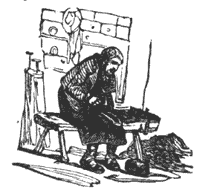
THE HORSE AND HIS RIDER.
A man a palfrey long possess'd,
A quiet, serviceable beast;
Spavin'd, indeed, and somewhat blind,
But still his way he well could find;
And if he stumbled now and then,
Was soon upon his feet again.
In short, for many a year, the pack
Had borne him safely on his back.
Till riding out one fatal day,
He overheard some coxcombs say,
[216]"For such a man, 'tis quite a shame,
To mount a horse old, blind, and lame."
"Aye," replied one, "I know a steed
Would nobly carry him indeed;
Young, vigorous, beautiful, and sound;
His like is nowhere to be found."
In evil hour an ear he lent,
To view this boasted courser went:
Unwary on his back he got,
And tried to put him on a trot;
He rear'd and plung'd, and leap'd about,
Till from his seat he shook him out,
Then kicking, pitch'd him o'er his head,
And laid him on the pavement dead.
The vicious creature left at large,
On all his fury would discharge;
This from behind his heels surprise,
Trod under foot, that sprawling lies:
Another, who would seize the reins,
Is bit and mangled for his pains.
But want of nourishment and rest
Will tame at last the fiercest beast;
[217]And rage itself suspends its course,
Exhausted by its proper force.
Light'ning no more his eyes inspire,
No more his nostrils snorted fire;
At bay he stood, fatigu'd and lank,
With flagging ears, and beating flank.
An active jockey, stout and able,
Contracts to bring him to the stable;
Soothes, and his neck begins to pat,
And the corn rattles in his hat;
By hunger drawn, repell'd by fear,
The courser neighs, retires, comes near;
Lur'd with the smell, begins to eat.
The jockey vaulted in the seat:
With vigorous hand the bridle plied,
And stuck the rowels in his side.
Some bounds and curvets still he made,
But soon submissively obey'd.
The horseman who such skill had shown,
Resolv'd to keep him for his own:
Aware that constant work alone
Can keep this wicked spirit down
[218]He night and day is on his back,
To lead him to some new attack,
No road is safe, nor far nor near,
This highwayman is every where.
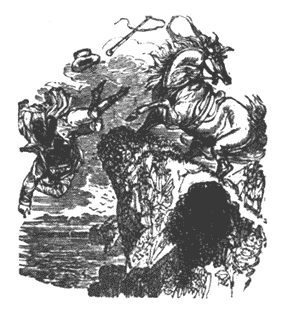
THE GOOD MINISTER.
An honest minister disgrac'd,
(Such are not easily replac'd,)
Found the sweet leisure in his fields,
To virtuous minds retirement yields.
The king, who had his foes believ'd,
The loss of him ere long perceiv'd.
To bring him back again intent,
To his retreat alone he went:
"My friend, you must return with me,"
He said, "your value now I see."
[220]"Forgive me," the Recluse replied;
"Here I determine to abide.
By sad experience well I know,
Were I to court again to go,
And all my best endeavors do,
To serve my country, sir, and you,
Art and intrigue so much prevail,
Again I certainly should fail;
Against your will and approbation,
And the good wishes of the nation,
You'd find yourself compell'd to yield,
And I once more must quit the field."
The honest man, who will not bend
To circumstance, or condescend
To pay his court to knave or fool,
Will never long a nation rule.
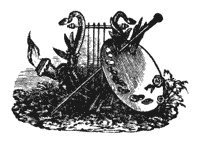
THE SWAN AND THE COOK.
A man once had a swan and goose
Among his birds and beasts.
The one was destined for a pet,
The other for a feast.
Sometimes you saw them sailing
Gracefully on the current, side by side,
Sometimes they played a game of tag,
Or plunged into the tide.
[222]One day the master ordered
The cook to kill the goose,
And roast it for his dinner;
It was fat and fit for use.
But the cook had taken a drop too much,
And it had gone to his head;
So when he went out for the goose
He took the swan instead.
He seized the swan fast by the throat,
And would have kill'd it soon:
But the bird saw he was to die,
And he his throat did tune,
And warbled out his farewell lay.
The cook straight dropped his knife
In great surprise, "what! what!" cried he,
"Shall I take the life
Of a musical bird like this?
No, no! it must not be.
So to the garden he shall go back
And ne'er be kill'd by me."
THE LYNX AND THE MOLE.
A lynx once met by chance a mole,
Just emerging from his hole.
The lynx with penetrating eye
The beauties of the place did spy,
And asked the mole to take a share
In the fine prospect, rich and rare.
"I've seldom found so good a place.
From this small hill you see a space
[224]Extended far beneath your view,
I like it much; pray do not you?
See now the sun begins to rise,
And with crimson tints the skies.
It spreads all round its genial heat,
And nature now enjoys a treat."
"Well, well!" the mole aloud did cry
"You may see this and more, but I
Can only now before me see,
A very heavy mist." "Truly,
Now," said the lynx, "I clearly see
The difference 'twixt you and me.
My eyes see with perception bright
While your's are always dark as night.
Go to your hold beneath the ground,
While I will range the forest round."
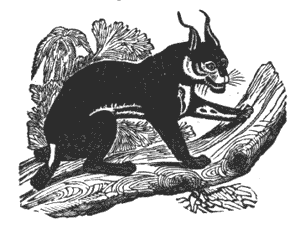
THE OLD CAT AND THE YOUNG MOUSE.
A young mouse of little experience,
Thought to soften an old cat,
And besought her clemency,
By asking for his life at her expense.
Said he, "A mouse, or e'en a rat,
Is not a great charge on the house;
And I shall not starve out the host.
Besides I seldom quit my post,
[226]And when I do a grain of corn
Has served me since I first was born.
Now I am thin, pray let me be,
I'll serve your children yet, you'll see."
Thus to the cat spoke the poor mouse.
The other answered, "You mistake,
When unto me this tone you take;
You might as well talk to the deaf,
As to so old a cat as I,
And through your tricks I spy,
Die! you can go and chatter to the fates,
My children will be fed on better cates."
MORAL.
Youth is sanguine, and hopes for all:
Old age is pitiless; so says our moral.
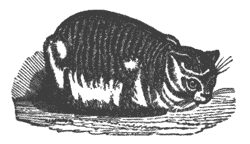
THE TWO FRIENDS.
Two real friends lived in Monomotapa,
All that belonged to one was for the other,
And each was unto each a brother.
The people of that country, thus,
Make better friends than among us.
[228]One night when fast asleep,
They each were sound reposing,
The eldest darted from his couch,
And stopped the other's dozing.
He runs to see his friend,
Awakes the slaves, and in the end,
Even his friend is quite alarmed,
And goes to seek the other,
With sword and purse. "My brother,
What can the matter be?
Here I am armed, you see,
Ready with sword to fight for you,
And here is money ready too,
If you have lost in play.
You're even welcome to my handsome slave,
With jet black hair, and eyes so grave."
"No!" said the other, "I need naught,
But ere I slept to-night, I thought,
Being in a trance, that you were sad,
And as the thought nigh drove me mad,
I hurried to your tent,
And found you sleeping quite content."
[229]MORAL.
Which of the two best loved the other?
Here is a thing to ponder on.
A true friend is a precious thing,
And all to aid you he will bring,
But with excess of love the other
In dreams was thinking of his brother.
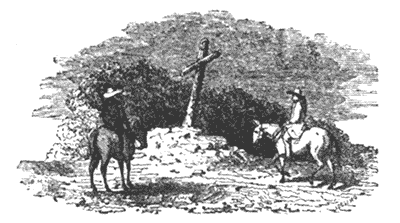
THE SICK STAG.
In a land where stags are many,
One fell sick, and not any
Of all his friends, delayed to come,
To offer aid and consolation,
In his sorrowful situation.
Said he, "My friends, pray let me die
In the right way, nor shed such tears."
Not at all, the consolers,
[231]With many a tear, and many a sigh,
Had come resolved by him to lie;
And when they left they helped themselves
Upon his lands, the greedy elves!
And drank from out his brook,
And every one of them such suppers took,
That when the stag revived,
He found his meals reduced;
So that while his friends had thrived,
He had to fast or die of hunger.
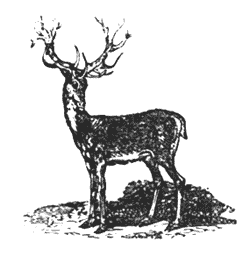
THE FOREST AND THE WOODMAN.
A woodman had broken or misplaced
The wooden handle of his axe,
This loss could not be well replaced.
So master woodman humbly prayed
From all the trees a single branch,
And promised to go elsewhere when he made
Again his livelihood,
[233]And he would touch nor oak nor pine.
The trees which were all very good
Furnished for him new arms,
And soon commenced all their alarms,
And their regret. The axe was mended.
And his repentance all was ended.
The miserable wretch but used it,
E'en as he had before abused it,
By felling down the forest trees,
Which groaned in spirit, and which died,
By arms they had themselves supplied.
MORAL.
This is the way the world goes on,
We use our benefits against our benefactors:
I am tired of speaking thereupon,
Till we obtain our wants, we are good actors.
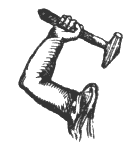
THE ELEPHANT AND THE MONKEY OF JUPITER.
Formerly the elephant and the rhinoceros
Disputing on the light of empire
Resolved to end the combat thus—
By fighting to their heart's desire.
The day was fixed, when it was heard,
That the monkey of Sire Jupiter
Had been seen in the air,
Poised on a cloud like any bird.
[235]The elephant was quite convinced
That to arrange the new election,
An interest the god evinced,
And felt for him a great affection,
He went to see the monkey's highness,
Expecting him to speak about the fight,
But not a word said monkey.
At this sight,
The elephant perceived that he must speak himself,
And so began: "Sire Jupiter," said he,
"Between rhinoceros and me will see
A royal combat of legation;
A tournament for all the nation.
I suppose you have already heard
This news!" Said monkey, "Not a word."
The elephant ashamed, and quite surprised,
Looked on the monkey with astonished eyes.
Said monkey, "In celestial place,
A fly or leopard are of equal race."
"Was it not then because of us,"
[236]Said elephant, "that you descended?"
"Nay," said the monkey, quite offended.
"I left the heavens to share a grain of corn
Among some ants, nor knew that you were born.
We have the care of mortal things;
But all are equals in our eyes,
And at your talk I feel surprise."
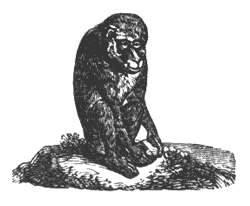
THE WOODCUTTER AND DEATH.
A woodman was toiling, all covered with dust,
But reach home with his faggot ere night he must,
Panting and weary he walks quite slow,
How to get home he does not know.
At last quite exhausted with toil and trouble,
With the weight of the burden and his years, bent double.
[238]He puts down his faggot, and thinks of his pains,
What is his work, and what are his gains,
How since he came into this weary world,
By the wheels of blind fortune around he's been twirled.
Was he not poor, a wood cutter, at best,
Oft without bread, always without rest.
He thinks of his wife, his children, his taxes,
At last quite warm with the subject he waxes.
He calls on death; who comes without delay,
The woodman, in terror, knows not what to say.
Death asks what to do the man wishes he should.
"Oh, help me," he said, "with this faggot of wood.
My poor bones ache, and my limbs they crack.
So help me to put it upon my back."
THE RAT AND THE OYSTER.
A rat who lived in the field,
A rat of little wit,
Once grew tired of his father's house,
And quietly left it.
He left the field, the grain and wheat,
Set out to travel, left his hole,
And just as soon as he was out,
"How large and spacious on the whole
[240]Is this great country spread about.
Here are the Apeninnes, and there Caucasus."
The smallest mole hill is a mountain.
At the end of some days our traveller arrives
At a certain canton where every oyster thrives,
And our famed traveller turned very pale,
Thinking he saw great vessels setting sail
"Mercy," said he, "My father was a dunce,
He did not dare to travel even once,
While I have seen already,
The maritime empire,
And travelled to my heart's desire."
From a certain learn'd man,
The rat had heard of such things,
And thinks he has seen all he can.
Among the many oysters closed,
There was one open, which reposed,
Mouth gaping, in the sun,
The learned, travelled man,
[241]The rat, approached, thinking to make
An excellent repast, and began to take
A bite at the fine oyster, plump and fat,
Whereupon closing on our rat,
The oyster caught him tight
And held him with all its might.
MORAL.
This fable goes to show,
That those mistake,
Who think that all they know:
When knowing nothing of the world,
Their giddy brain is quickly whirled.
And hence this moral let us make,
That he is caught, who thinks to take.
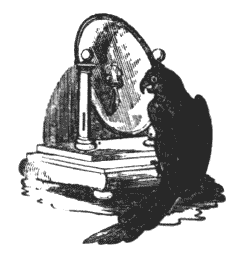
THE PHYSICIANS.
Dr. So-much-the-worse went out to see
A patient sick as one could be.
His brother So-much-the-better,
Having received an urgent letter,
Came also the sick man to visit.
So-much-the-worse declared he'd die,
So-much-the-better asked him why.
[243]And while their plans they thus discourse,
The sick man died, so much the worse!
So-much-the-better now declared,
That if the sick man had not despaired,
He would have lived. So-much-the-worse
Said, "I was right, agree with me,
Our patient's dead, as you can see."
MORAL.
There's wisdom in the saying, by my troth,
Too many cooks will spoil the broth.
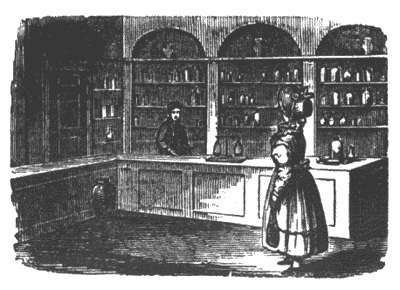
THE MOUNTAIN IN LABOR.
A mountain thought to be in labor,
Made such a horrid noise,
That round it each stranger came and neighbor,
Thinking the end of all this noise would be
A city, quite as large as three.
Having drawn all the province round,
The mountain from a little mound,
Let out a mouse.
[245]MORAL.
When I think upon this fable,
Of which the narration is false,
And the sense true;
It puts me much in mind
Of authors not a few,
Who boast that they are able
To write on any subject as they please,
And after all—do nothing.
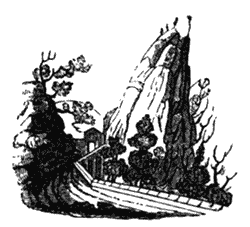
THE CAT METAMORPHOSED INTO A WOMAN.
A man was passionately fond of his cat,
He thought she was pretty, and sleek, and all that;
And she purred in the softest tone,
He wished to make her his own.
This man by prayers, by tears,
By sorcery and charms,
Changed pussy to a woman fair,
And took her in his arms.
[247]But in the wainscot soon a rat
Made itself manifest,
And very soon the pussy cat,
Could still no longer rest.
Her foolish husband who believed
That nothing had of cat remained,
And as his wife had her received—
Was, now, I warrant, somewhat pained.
Next time the vermin came,
Pussy was surer of her game—
For having changed her face,
The mice not frightened,
Did not change their pace—
And the astonished spouse
Was very glad—
To change her back—
And was no more cat-mad.
MORAL.
What in the bone is born,
Will in the flesh remain,
Both night and morn,
And ne'er come out again.
THE FROG AND THE RAT.
He who another thinks to injure,
May in the end destroy himself.
A rat who fed exceeding well,
Was by a frog invited out to dine;
"The voyage," said froggy, "will be quickly made,
If you will tie your foot to mine."
Frog vaunted the delight of bathing,
[249]Praised the varieties they'd met upon the way,
And when the rat consented to be tied,
Attempted to bear him away.
The rat half drowned resisted all he could.
The frog, imaged the dinner he would make;
Suddenly, flying from a neighboring wood,
A hawk appeared, and quickly did he take
Both of the combatants up in his bill,
Before they e'en had time to make their will;
And quite delighted did the greedy sinner
Make off of fish and flesh a hearty dinner.
For in the hawk's dominions, fast days
Are never kept.
Now if the frog had acted as he ought,
And had not tried to dine off the poor rat,
They would not both have perished,
To make fat,
[250]A pampered hawk;
And master rat,
Had he not been so curious about
Aquatic government,
Had from the scrape got safely out.
MORAL.
A scheme or a conspiracy,
Be it all plotted well
As safe, 'twould seem as it could be,
And sure of all success,
May, none the less,
Entirely fail,
And grand conspirators,
And all bewail,
The day that set them scheming.
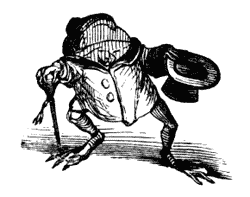
THE LION AND THE FLY.
A lion by a gad-fly worried,
Half maddened by his sting,
Exclaimed, "Be off, vile fly—
Mean, pitiful, base thing!"
After the fly had ended his repast,
Fully exhausted feels the beast at last,
And roared so that he shook the earth,
[252]While the victorious fly
Met in the spider's web his destiny.
MORAL.
Two morals draw I from this tale:
First, We should fear the smallest enemy;
And second, We may escape great perils,
And from a trifling cause may die.
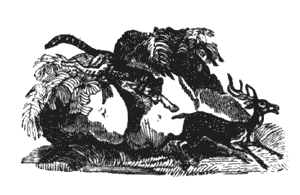
THE TWO MULES.
Two mules went travelling on their way,
One with a sack of corn;
The other with gold and bells so gay,
Most gaily tripped along.
Proud of so rich a load,
He kept the bells a ringing—
And was so proud, had he known how
He would have commenced singing.
[254]Soon some robbers rude appeared,
Who stopped this mule upon his road,
And very soon they had him cleared
Of all his weight of precious gold.
Falling beneath their blows, "I die,"
The expiring trotter cried,
"Had you been," said the other,
"Low as I, you would not thus have died."
Be moderate when you are high,
Nor glory o'er the passers by.
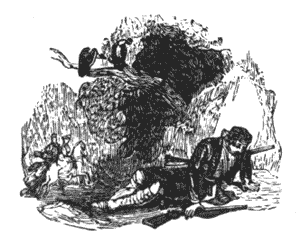
JUPITER AND THE FARMER.
Jupiter had a farm to let,
Mercury advertised it, and people came,
Made offers, listened, all the same,
Made some objection.
One declared the land
Was rough and dry,
And full of sand.
[256]One had this reason, one had that,
Until at last a man appeared,
Who said he'd try to farm it, agreed that
He might have any weather that he chose.
Behold! as soon as he but yawns, it blows
Or rains, or is quite clear.
His neighbors, even the most near,
Are not affected by these changes.
In usual route, their weather ranges;
They have good crops,
But he had none.
At last when tired, he began
Complaining unto Jupiter.
The next year the same thing,
Changes of weather he can bring—
And the neighbors no more
Than the Americans,
Are troubled by the farming
Of his lands.
At last tired out, with all his strife in vain,
He yields his power to the God of rain;
[257]Acknowledging, that all along
The god did right,
And he did wrong.
MORAL.
Let us conclude that Providence
For man ordains much better than we can.
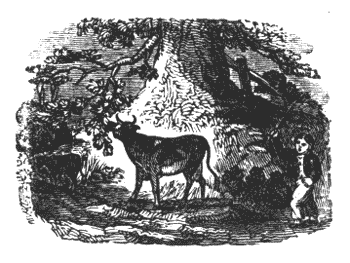
THE COCK, THE CAT, AND THE LITTLE MOUSE.
A young mouse, who had nothing seen,
Was nearly caught; You shall hear how
He told his mother the adventure—
He said, "Pray, listen, now:
I started out to frolic at a venture,
When two fine animals appeared
Before my eyes,
And filled me with surprise.
[259]One was soft, benign, and sweet,
The other, turbulent, and full of inquietude,
Had a loud voice, piercing and rude,
And on his head a piece of flesh.
A sort of arm raised him up in the air,
As though to fly out of a mesh—
His tail was spread out like a fan."
Now it was a cock of which our little mouse,
Made to his mother this fine picture,
Describing him like an enthusiast.
"He beat," said he, "his flanks,
With his two arms,
Making such a noise and such a din,
That, frightened half to death,
I hurried in.
Although I pique myself upon my courage
And heartily I cursed him in my heart,
For but for him, I'd taken part,
In conversation with the gentle creature,
Who my advances would encourage.
She is velvety, like us, with a long tail,
[260]A modest look, and sparkling eyes,
And is much like a rat. She spies
The objects round her. I turned pale
On hearing the other creature's din,
Or else I should have asked her in."
"My child," said the mother, "this last was a cat,
An enemy of every mouse and rat.
The other a cock, whom do not fear,
Perhaps we may dine on him here."
Take care, whatever they may seem,
Of judging people by their mien.
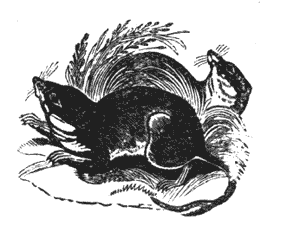
THE MONKEY.
The animals, on the death of the lion,
During his life, prince of the country,
Resolved to elect a king to try on
The regal crown, and chose a monkey.
Because after the animals had all
Tried on the regal crown, or let it fall,
Because their heads were all too big,
Or too small, too horned, or too thick,
The monkey slipped through it;
And with it cut up many a trick,
[262]Which they all thought refined,
And chose him with one mind.
Only the fox regretted the election,
And swore to reign in his defection.
He came and made his compliment;
"Sire," said he, "I know a treasure meant
For your high majesty. I will show
The spot where it lies hid."
The monkey went at Reynard's bid—
And was caught in a trap.
The fox exclaimed,
"How do you think to govern us,
When, after all, with all your fuss,
You cannot well, do what you may,
Keep e'en yourself out of harm's way."
The animals agreed,
That royal power suits very few indeed.
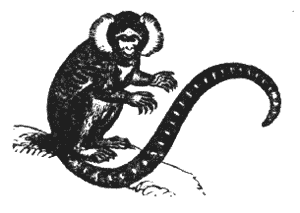
THE HORSE AND THE ASS.
An ass accompanied by a horse uncourteous,
Who only had his harness on his back;
And the poor jackass staggered
'Neath the load of vegetable and a pack;
He begged the horse to help him,
If he could—
But not a single bit,
The other would.
[264]"I ask," said the poor beast,
"A little pity—
Help me at least,
To reach the city."
The horse refused,
And got his due,
For the ass died.
The farmer's man
Stripped off the skin of honest Ben,
And made the horse, whom they espied,
Drag on the skin and the cart beside.
MORAL.
'Tis wise to lend our aid
To others in distress,
We often thus are made
The means of happiness.
The churlish, unkind man
His neighbor's death may cause,
And have to help his family,
Through taxes and the laws.
THE ASTROLOGER WHO FELL INTO A WELL.
An astrologer, of high ambition,
While star-gazing fell down
Into a well. "Sage gentleman,"
Remarked the people of the town,
"How did you think to read the stars, old man,
When you cannot preserve your own position."
[266]This adventure in itself, without going further,
Might serve as a lesson, to most of mankind,
For of us mortals, a certain part inclines,
To the belief, that, with the help of mind,
The book of Destiny may easily be read,
But this book, by Homer and his disciples sung,
What is it called but Chance, by ancients,
And by us Christians named Providence instead.
Now in Chance there can no science be,
Or why should it be called by them Chance—
And things uncertain, who knows in advance?
If all depends upon the fixed decree,
Of Him who does all things, and nothing does unwisely.
How should we read his will,
And know that which from us he would conceal?
[267]Wherefore watch the stars so nicely,
To know how to avoid inevitable woe;
Or how, in future times, our fate will go;
To make us, in the midst of pleasure, sad,
Or with predicted evil, drive us mad,
Convert all blessings into curses dire?
Is this the knowledge to which we aspire,
Is it an error or a crime thus to believe
That future destiny can thus be known?
In place of star-gazing above our head,
Let us confide ourselves to the Great One.
The firmament exists, the stars go on their way,
And the sun shines upon us every day;
And every day, the day is lost in night,
Without our knowing aught else from the sight.
That the seasons come, the crops are ripe,
And in what wood we should look out for snipe,
And some few other things, but for the change
[268]Of day to night, by which the world doth range,
It has not aught to do with Destiny.
Quacks, and ye compilers of horoscopes,
Quit all the courts of princes in Europe,
And take with you all mischief makers
You deserve belief no more than they do.
MORAL.
This astrologer in the well,
Resembles all of his false art,
Who while they are in danger, dream
That in the stars, they read the happiest theme.
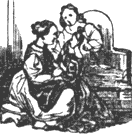
THE ANIMALS SICK WITH THE PLAGUE.
A scourge which spread terror,
Invented by heaven to punish earth—
The plague (if to name it be no error)
Was making every animal
To curse his birth.
In one day it might have enriched Acheron,
And upon beasts made busy war.
[270]Amongst them all there was not one,
But, sick and ailing, was complaining sore;
All did not die, but each was ill—
Not one strove now to eat his fill,
No meat excited them to taste,
Nor did the wolves again lay waste,
The innocent prey.
Even the doves fled from each other,
And cooed no more the live-long day.
The lion held war counsel—"My brother,"
Said he, addressing each in turn,
"I think that heaven hath allowed
This punishment on us to fall
For the sins we have disavowed.
Now I for one will confess all,
And let him who is most to blame,
Be slaughtered in the others' name.
Perhaps he may obtain a common cure,
For history tells us that in like cases,
The guilty die in others' places;
Let us not then be false to Nature,
[271]Let us confess our faults—in fine
I will the first acknowledge mine;
And I avow, that oft I keep
A serious tax on harmless sheep.
What had they done,
In naught offended—
Yet I their quiet lives have ended.
Sometimes, with sorrow be it heard,
I e'en have eaten the shepherd,
And I acknowledge all—
And I will die like a quiet bird—
If my death keep you from your fall.
It must be hoped now in all justice,
That he who is most guilty perish."
"Sire," said the fox, "you are too good a king
To die for any trivial thing;
Your simples are too nice.
Eat sheep, and why not?
Is it a sin? is it a vice?
No, sire, you did them honor;
And as for shepherds, I desire,
That over us their false empire
[272]Should cease, and we have all we want
Of sheep and fleece."
So said the fox, flatterers applaud,
The tiger, bear, and other powers they laud,
Even for their most violent offence.
All quarrelsome people,
Down to the mastiffs,
Were little saints.
But when the donkey's turn came on,
They heard him with many ifs.
He said, "I now remember
That by a monk's garden passing,
(It was late in December,
And my strength soon faints,)
I ate a leaf of some dry plant,
And e'en now I with terror pant."
They seized upon him and devoured,
And said he was the cause
Of heaven's anger being lowered.
With interested judges, right
Is always on the side of might.
THE CANDLE.
It was in the home of the Olympian gods,
That bees first lodged, 'tis said,
On Mount Hymettus; and thitherwards
Came zephyrs with light tread.
When from the hives, the honey,
Had all been taken out,
As there remained naught but wax,
Some candles were, for money,
Carefully made and sold in packs.
[274]One of these candles on a certain day
Seeing that clay by fire was turned to brick,
Thought he could harden his body the same;
And getting near the fire to try the trick,
This new Empedocles to flame condemned
Soon found of his philosophy the end.
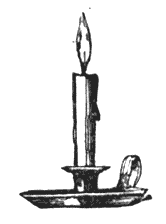
THE HOG, THE GOAT, AND THE SHEEP.
A goat, a sheep, and a fat hog,
On the same cart were bound for the fair.
They lay as quietly as any log,
But were not seeking their amusement there.
They were to be sold, so says the story.
[276]The carter, who his business knows,
Don't take them into town to see the shows.
Dame porker was inclined to squeal,
As though the butcher's knife she 'gan to feel.
Her grunts, and squeals, and cries
Were loud enough to deafen one,
The other animals more wise,
And better tempered, with surprise
Exclaimed, "have done!"
The carter to the porker turned,
"Where have you manners learned,
Why stun us all? Do you not see
That you're the noisiest of the three?
That sheep says not a word,
Nor can the young goat's voice be heard."
"But," said the hog, "they both are fools.
If like me they knew their fate,
They'd halloo out at greater rate,
The goat will only lose her milk,
The sheep his wool, but here, poor me,
I'm to be eaten, and know my destiny."
[277]The porker was quite right,
But hallooing with all her might,
Was all too late,
And could not alter her sad fate.
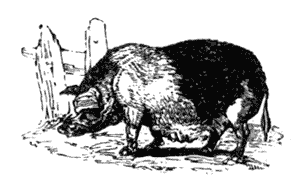
THE DELICATE HERON.
By the bank of a river,
A heron walked out,
And in it were sporting,
Pike, mackerel and trout.
Now these fish with great ease,
Our bird might have caught,
But I'll wait till I'm hungry
The silly bird thought.
[279]At last came his appetite,
"Now I'll eat," the bird cries,
And some tench from the bottom,
Just then he saw rise.
"But these are not good enough
At this time of day,"
And he waited for better
Till all swam away.
At eve almost starved
When all other means fail,
He was right glad to sup
On a poor little snail.
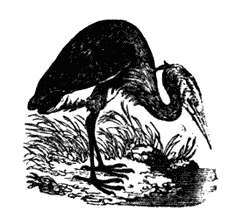
THE BLACKAMOOR AND HER MISTRESS.
A foolish young lady,
Took one of her maids,
Who chanced to be black
As the ace of spades,
And said she'd have her washed white,
By the other maids;
She was put in a tub,
And with water and towels
[281]Her skin they did rub,
Through a long summer day till the night;
But the more they did rub her,
The blacker she got;
And while they did scrub her,
She mourned her hard lot.
So the maids threw away
All their labor and care,
And the mistress gave up
Her fine scheme in despair.
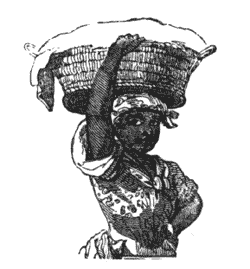
THE BEAR AND THE GARDENER.
A bear and gardener,
Who mutually tired
Of solitary life,
And were inspired,
With a warm friendship for each other,
Promised to be to one another,
Excellent friends, and so they were.
As for the death of the poor man
I'll tell you how it happened,
If I can.
[283]The bear watching the gardener in his sleep—
Beholding on his head a fly,
And thinking it bad company,
Took up a stone and dropped it down,
Upon the fly 'tis true,
But broke the gardener's crown.
MORAL.
To make our fortunes or to mend,
A most malignant enemy
Is better than a foolish friend.
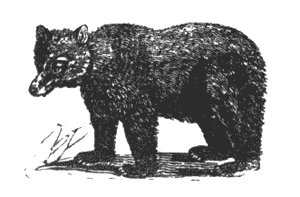
THE VULTURES AND THE PIGEONS.
The wing'd inhabitants of air
Waged on a time a direful war.
Not those, in budding groves who sing,
To usher in the amorous spring;
Nor those, with Venus' car who fly
Through the light clouds and yielding sky
[285]But the rapacious vulture brood,
With crooked beak that thirsts for blood,
And iron fangs. Their war, 'tis said,
For a dog's carrion corse was made.
Shrill shrieks resound from shore to shore;
The earth beneath is sanguin'd o'er;
Versed in the science to destroy,
Address and valor they employ.
'Twould take a hundred tongues to tell,
The heroes from the air who fell.
The dovecote race, a gentle nation,
Made offers of their mediation.
Prudent ambassadors are sent;
The vultures with the terms content,
Agree their guarantee to take,
And armistice and treaty make.
This kind desire to interfere,
Cost the poor peace-makers full dear.
To rapine bred, the ruthless crew,
Nor gratitude nor faith who knew,
On the defenceless pigeons fall,
And shortly had devoured them all.
[286]MORAL.
When tyrants from their quarrels cease,
Some weaker neighbor pays their peace.
His safety in their warfare lies;
Their feuds, not he should compromise.
When Joseph, Frederick, and Kate,
Tired of unprofitable hate,
Their animosities would heel,
They swallowed Poland at a meal.
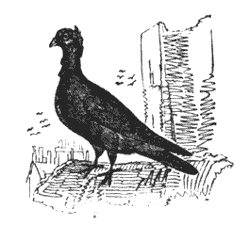
THE BEAR AND THE BEES.
A bear once rambled from his home,
Chanced through a garden trim to roam,
Where, 'neath the shelter of the trees,
The farmer had his hives of bees.
Bruin loved honey. "Now," said he,
"I'll rob your store-house, Master Bee.
You'll buz, and hum about my ears,
But noise a brave bear never fears."
[288]So saying, bear o'erturns a hive,
And straight the air is all alive,
With angry enemies, who sting
As well as buz; and make bear sing,
A lively tune of growls and roars,
And cover him with smarting sores.
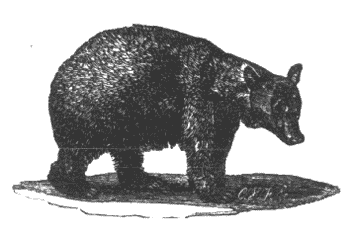
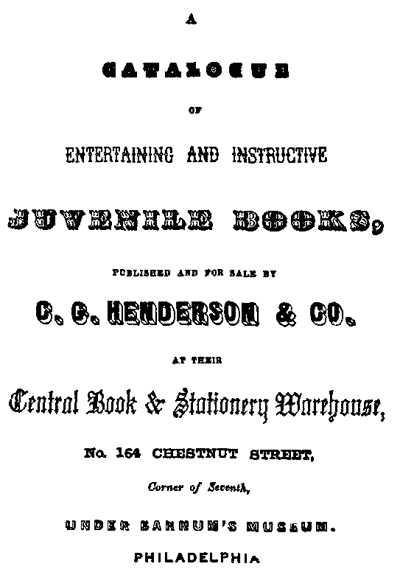
A
CATALOGUE
OF
ENTERTAINING AND INSTRUCTIVE
JUVENILE BOOKS,
PUBLISHED AND FOR SALE BY
C. G. HENDERSON & CO.
AT THEIR
Central Book & Stationery Warehouse,
No. 164 CHESTNUT STREET,
Corner of Seventh,
UNDER BARNUM'S MUSEUM.
PHILADELPHIA
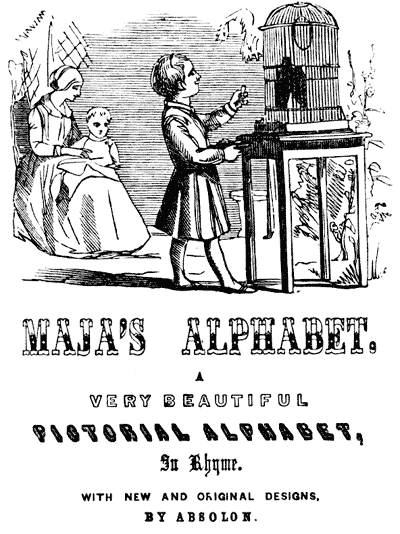
MAJA'S ALPHABET.
A
VERY BEAUTIFUL
PICTORIAL ALPHABET,
In Rhyme.
WITH NEW AND ORIGINAL DESIGNS,
BY ABSOLON.
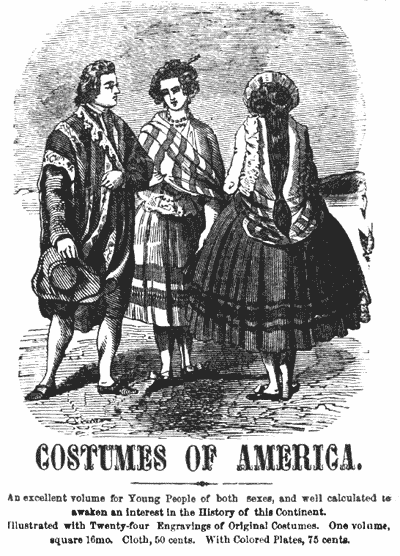
COSTUMES OF AMERICA.
An excellent volume for Young People of both sexes, and well calculated to awaken an interest in the History of this Continent.
Illustrated with Twenty-four Engravings of Original Costumes. One volume, square 16mo. Cloth, 50 cents. With Colored Plates, 75 cents.
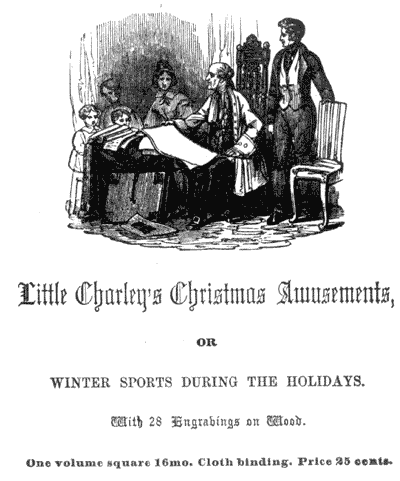
Little Charley's Christmas Amusements,
OR
WINTER SPORTS DURING THE HOLIDAYS.
With 28 Engravings on Wood.
One volume square 16mo. Cloth binding. Price 25 cents.
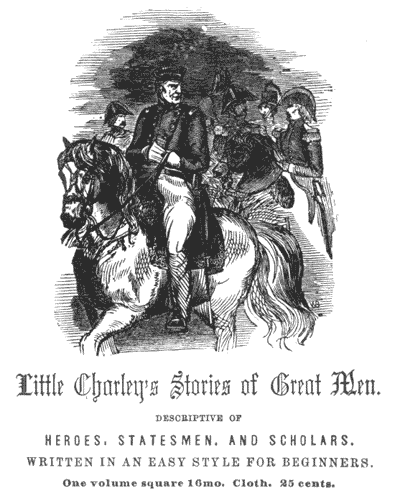
Little Charley's Stories of Great Men.
DESCRIPTIVE OF
HEROES, STATESMEN, AND SCHOLARS.
WRITTEN IN AN EASY STYLE FOR BEGINNERS.
One volume square 16mo. Cloth. 25 cents.
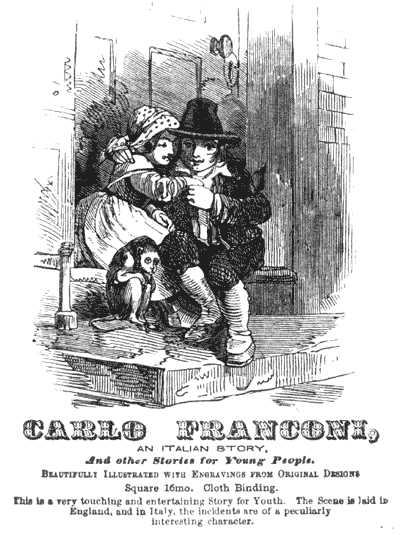
CARLO FRANCONI,
AN ITALIAN STORY,
And other Stories for Young People.
Beautifully Illustrated with Engravings from Original Designs
Square 16mo. Cloth Binding.
This is a very touching and entertaining Story for Youth. The Scene is laid in England, and in Italy, the incidents are of a peculiarly interesting character.
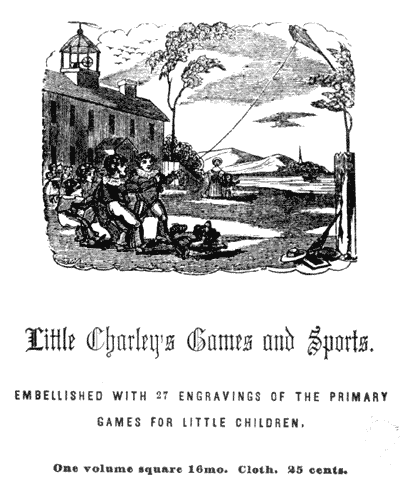
Little Charley's Games and Sports.
EMBELLISHED WITH 27 ENGRAVINGS OF THE PRIMARY
GAMES FOR LITTLE CHILDREN.
One volume square 16mo. Cloth. 25 cents.
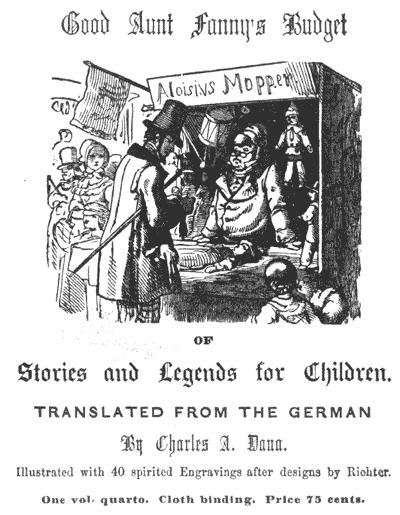
Good Aunt Fanny's Budget
OF
Stories and Legends for Children.
TRANSLATED FROM THE GERMAN
By Charles A. Dana.
Illustrated with 40 spirited Engravings after designs by Richter.
One vol. quarto. Cloth binding. Price 75 cents.
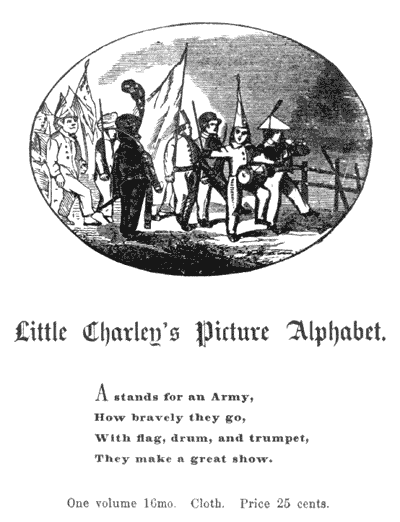
Little Charley's Picture Alphabet.
A stands for an Army,
How bravely they go,
With flag, drum, and trumpet,
They make a great show.
One volume 16mo. Cloth. Price 25 cents.
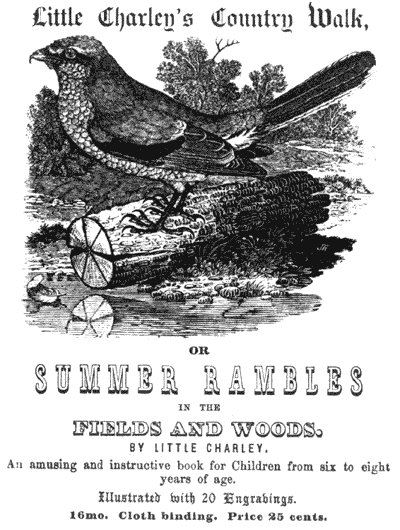
Little Charley's Country Walk,
OR
SUMMER RAMBLES
IN THE
FIELDS AND WOODS.
BY LITTLE CHARLEY.
An amusing and instructive book for Children from six to eight years of age.
Illustrated with 20 Engravings.
16mo. Cloth binding. Price 25 cents.
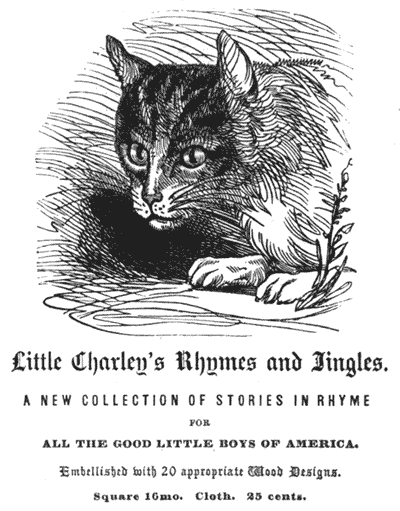
Little Charley's Rhymes and Jingles.
A NEW COLLECTION OF STORIES IN RHYME
FOR
ALL THE GOOD LITTLE BOYS OF AMERICA.
Embellished with 20 appropriate Wood Designs.
Square 16mo. Cloth. 25 cents.
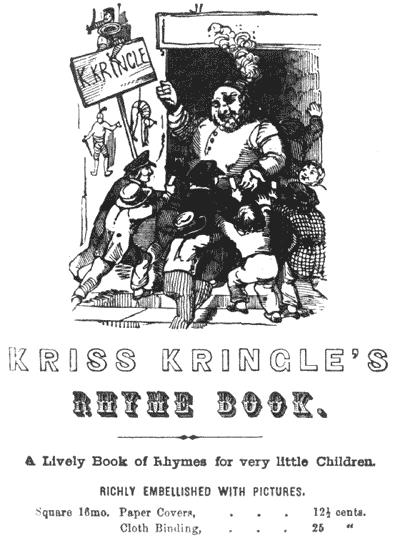
KRISS KRINGLE'S
RHYME BOOK.
A Lively Book of Rhymes for very little Children.
RICHLY EMBELLISHED WITH PICTURES.
| Square 16mo. | Paper Covers, | 12½ | cents. |
| Cloth Binding, | 25 | ” |
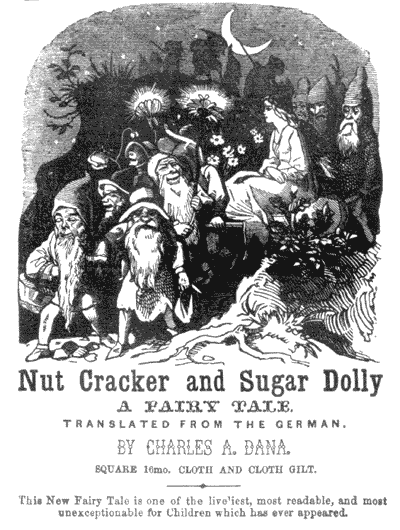
Nut Cracker and Sugar Dolly
A FAIRY TALE.
TRANSLATED FROM THE GERMAN.
BY CHARLES A. DANA.
SQUARE 16mo. CLOTH AND CLOTH GILT.
This New Fairy Tale is one of the liveliest, most readable, and most unexceptionable for Children which has ever appeared.
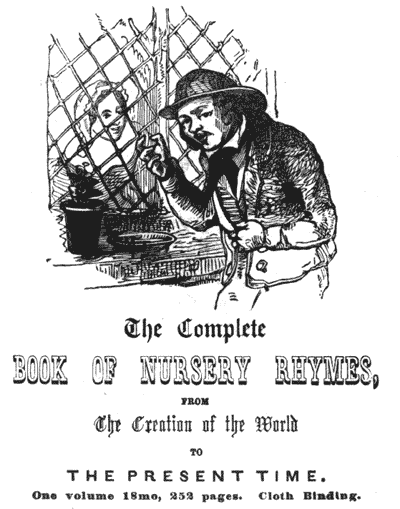
The Complete
BOOK OF NURSERY RHYMES,
FROM
The Creation of the World
TO
THE PRESENT TIME.
One volume 18mo, 252 pages. Cloth Binding.
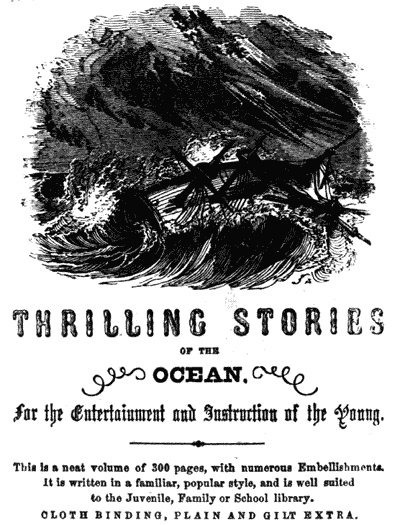
THRILLING STORIES
OF THE
OCEAN.
For the Entertainment and Instruction of the Young.
This is a neat volume of 300 pages, with numerous Embellishments. It is written in a familiar, popular style, and is well suited to the Juvenile, Family or School library.
CLOTH BINDING, PLAIN AND GILT EXTRA.
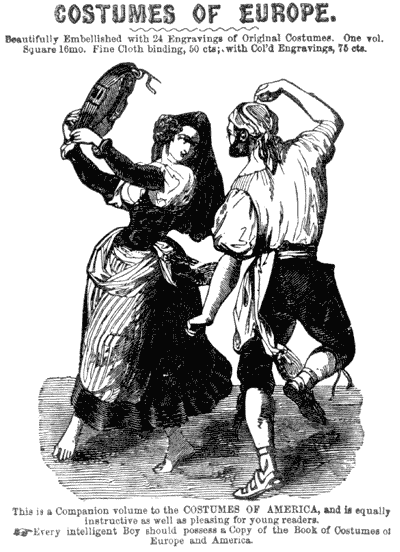
COSTUMES OF EUROPE.
Beautifully Embellished with 24 Engravings of Original Costumes. One vol. Square 16mo. Fine Cloth binding, 50 cts; with Col'd Engravings, 75 cts.
This is a Companion volume to the COSTUMES OF AMERICA, and is equally instructive as well as pleasing for young readers.
 —Every intelligent Boy should possess a Copy of the Book of Costumes of Europe and America.
—Every intelligent Boy should possess a Copy of the Book of Costumes of Europe and America.

